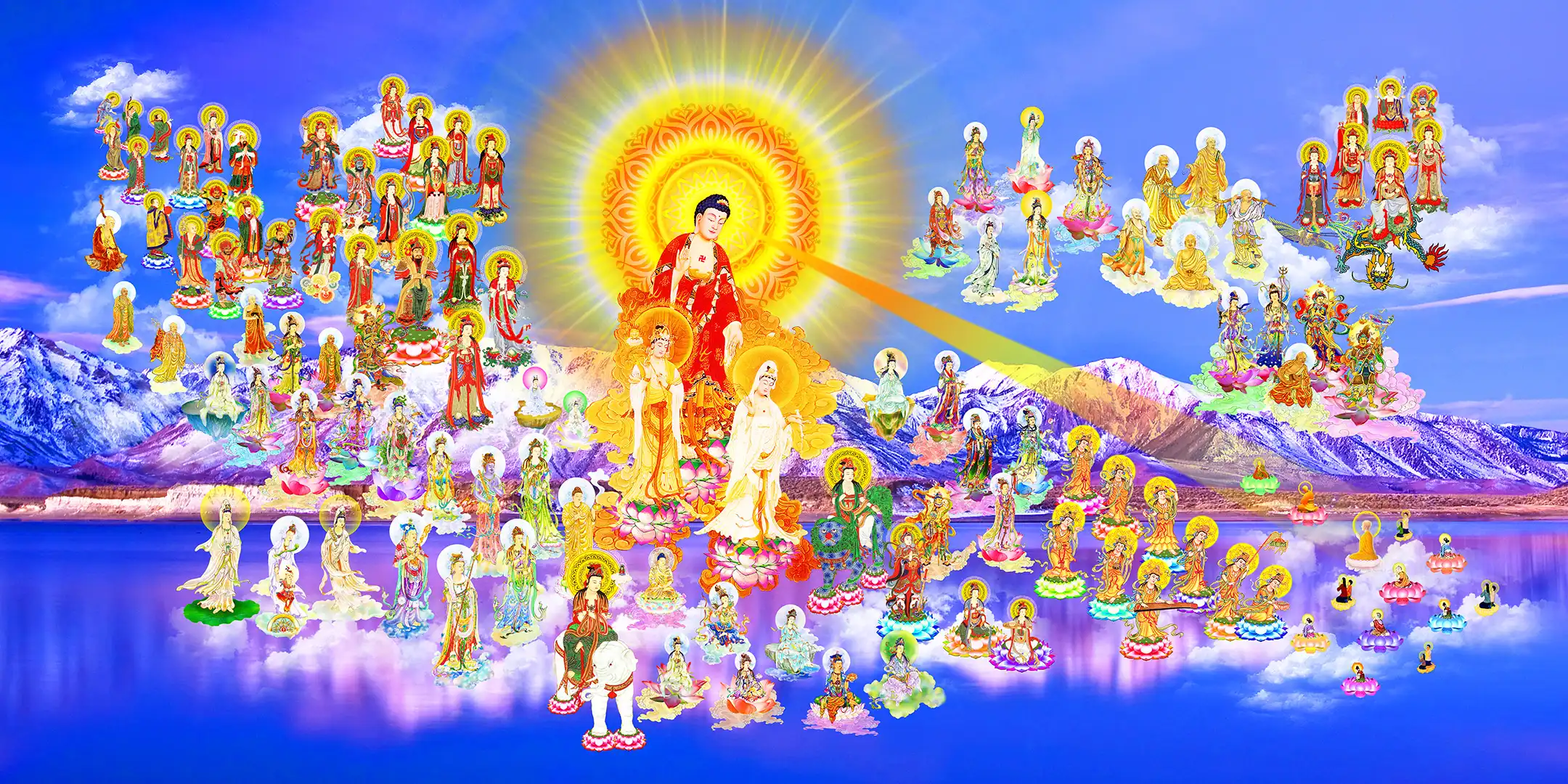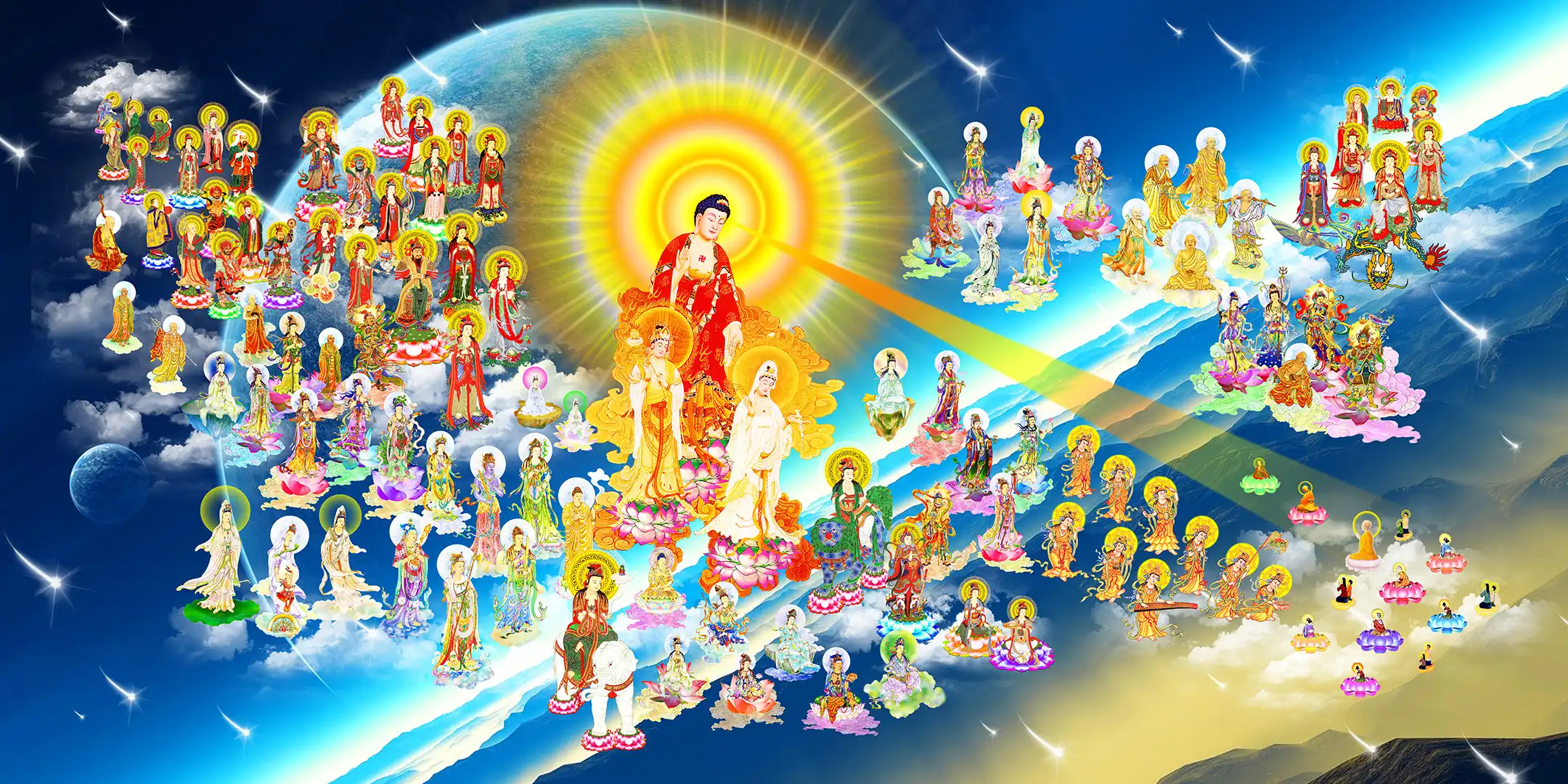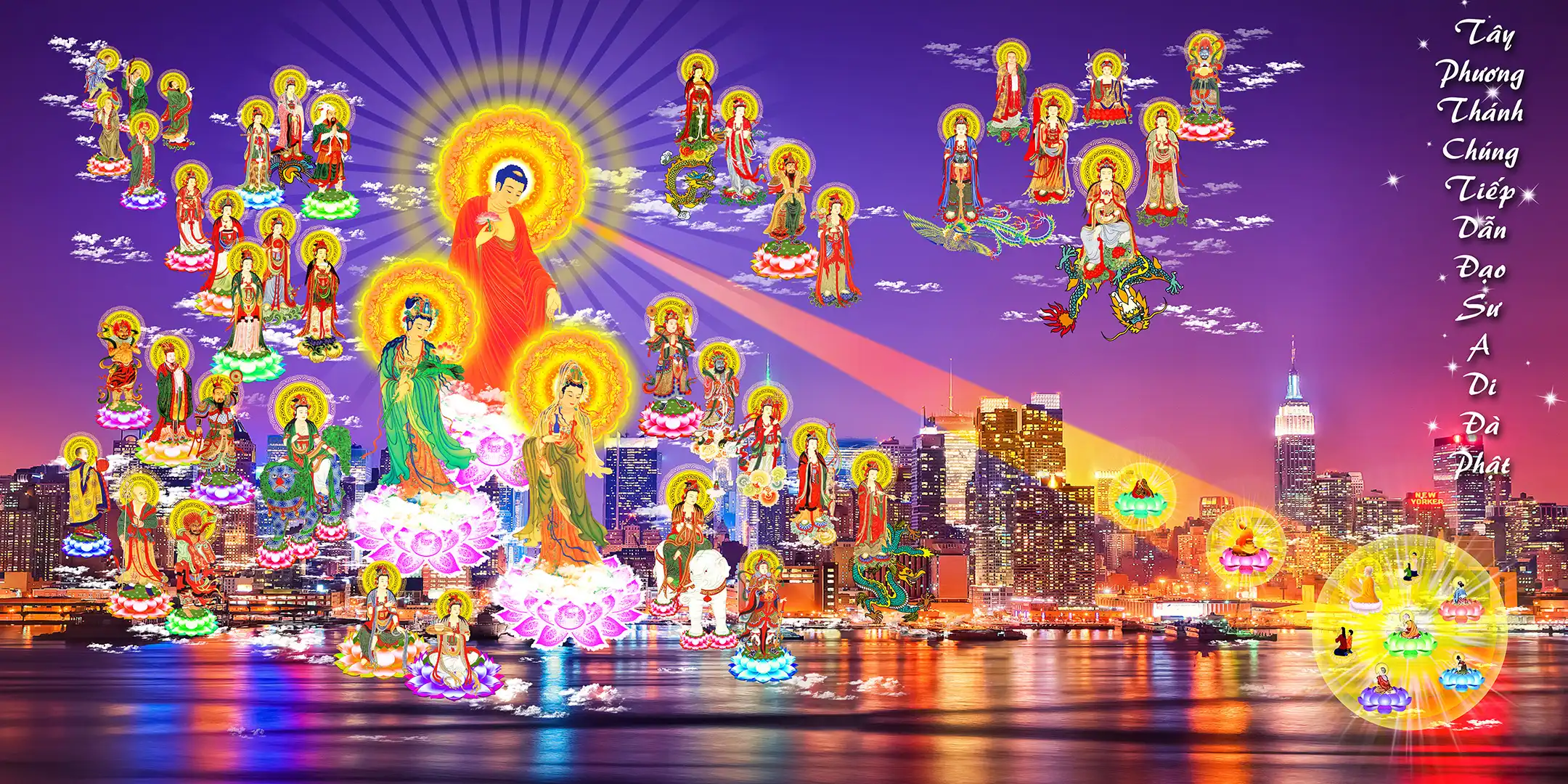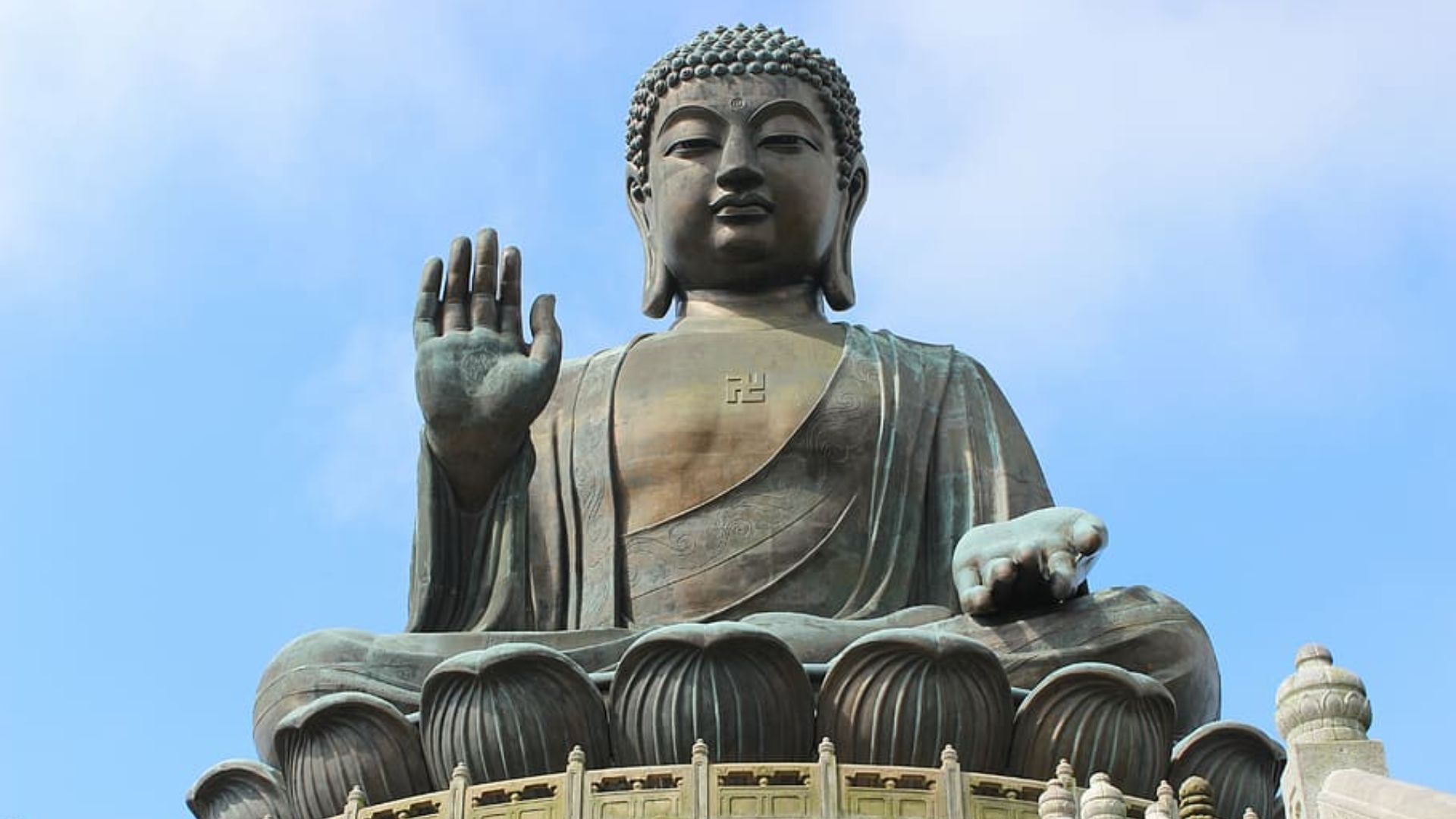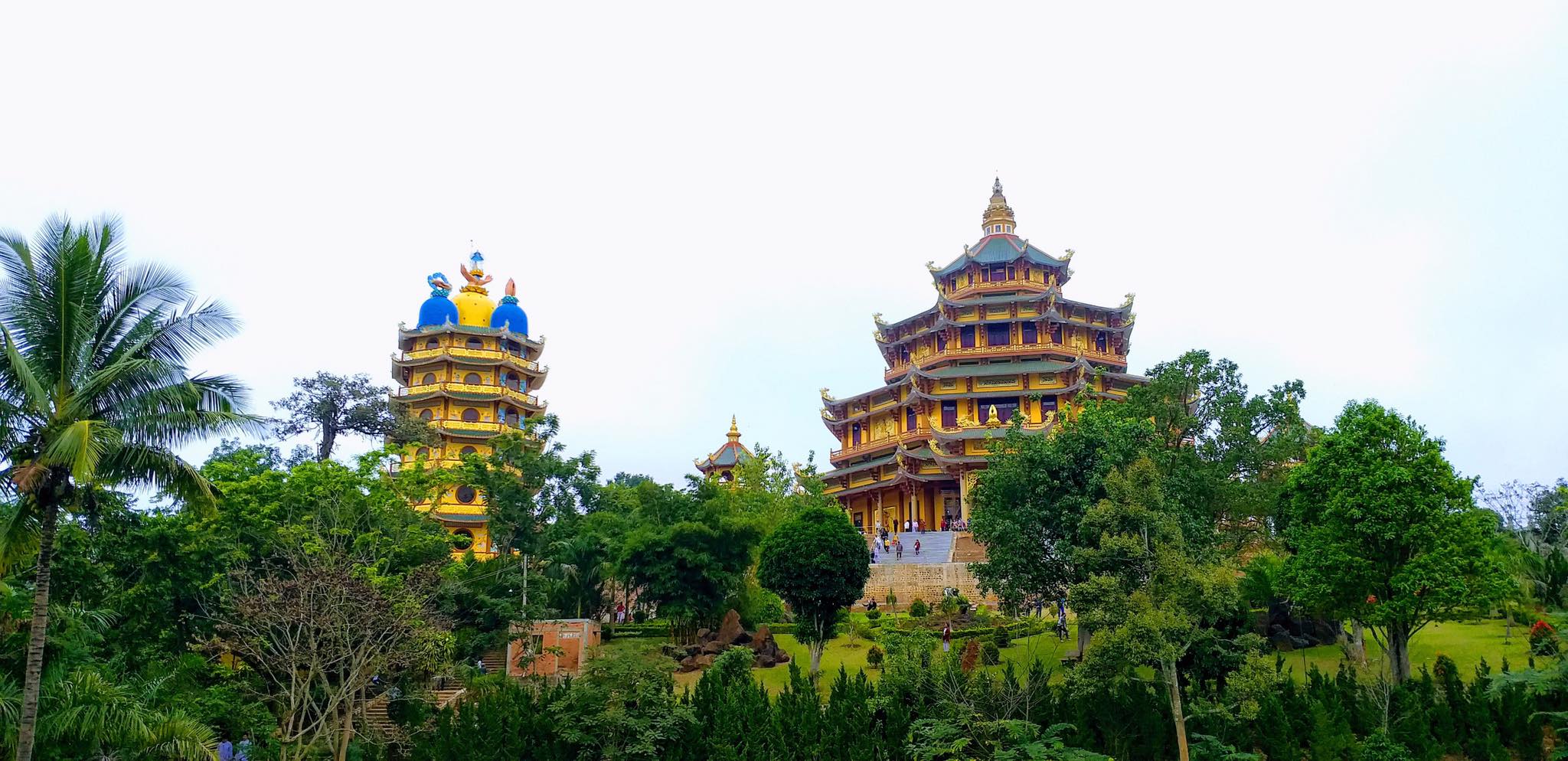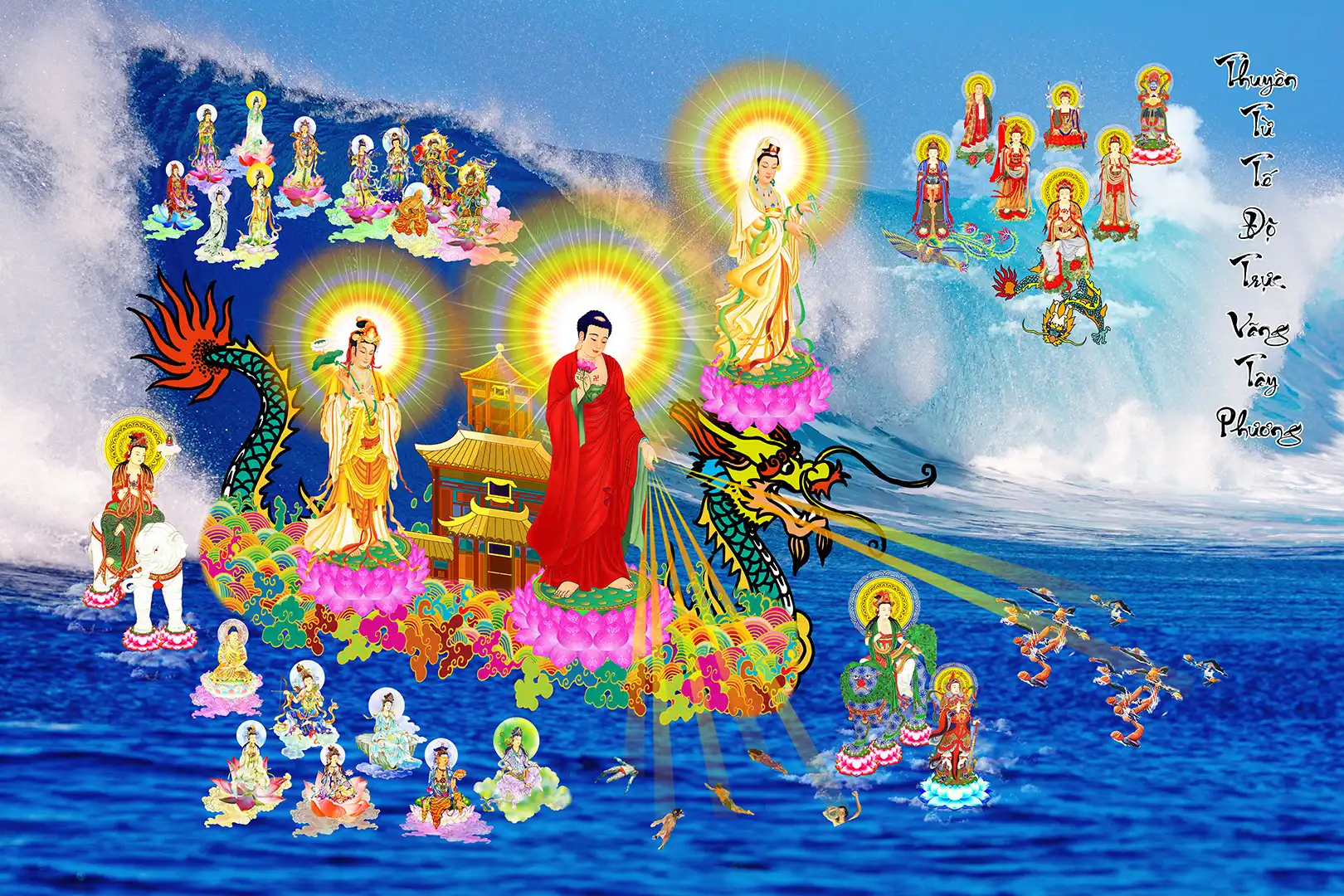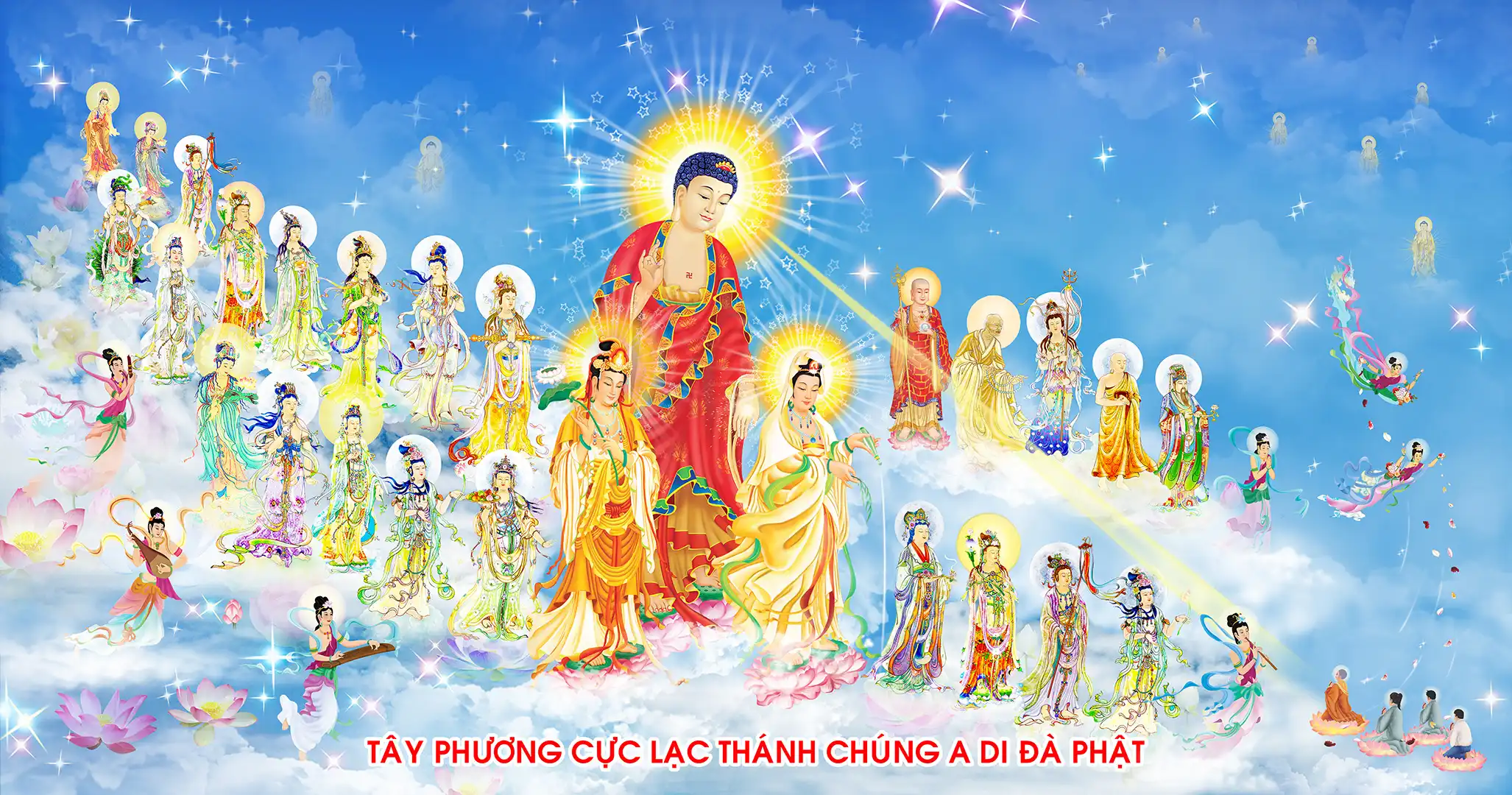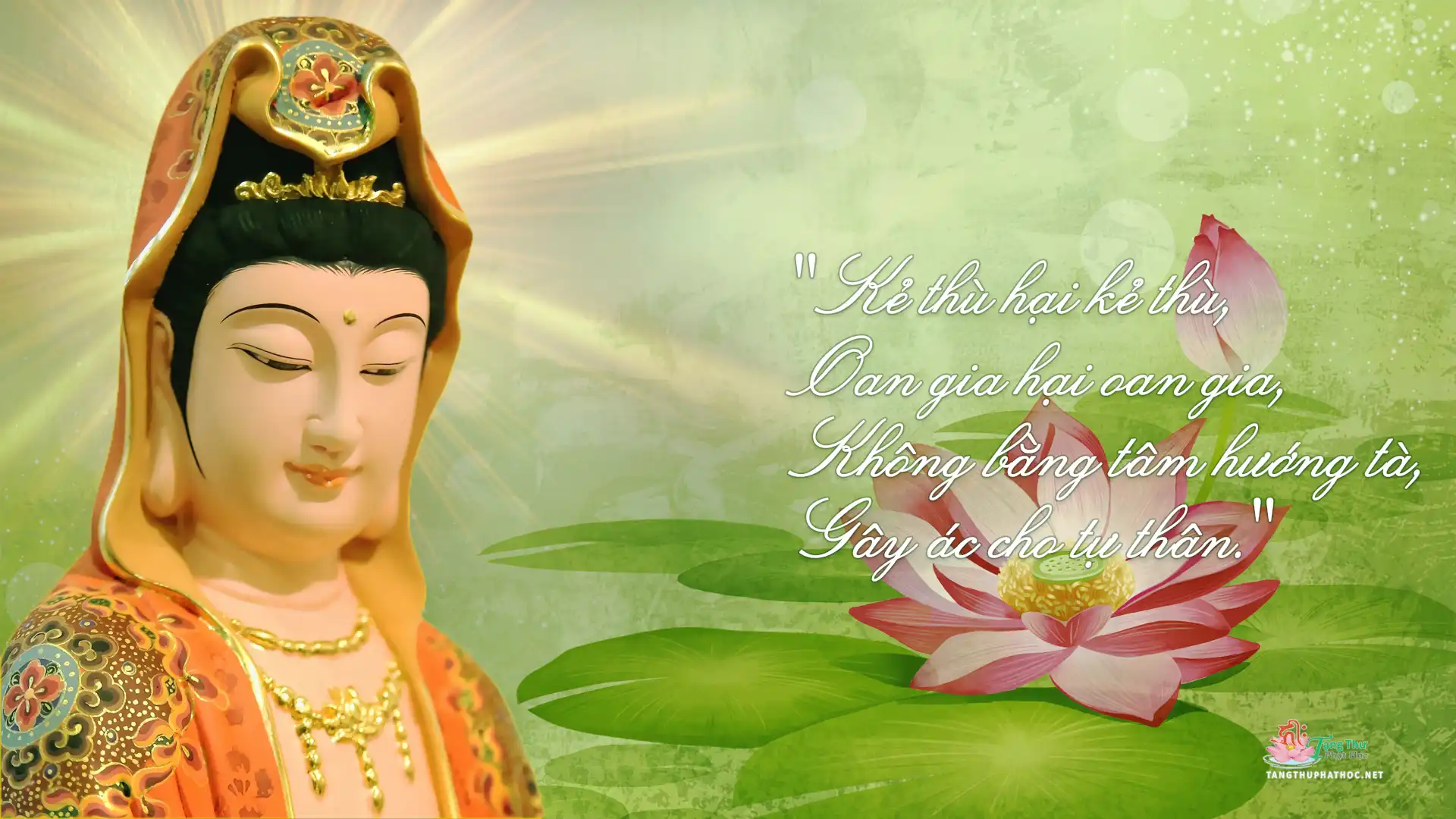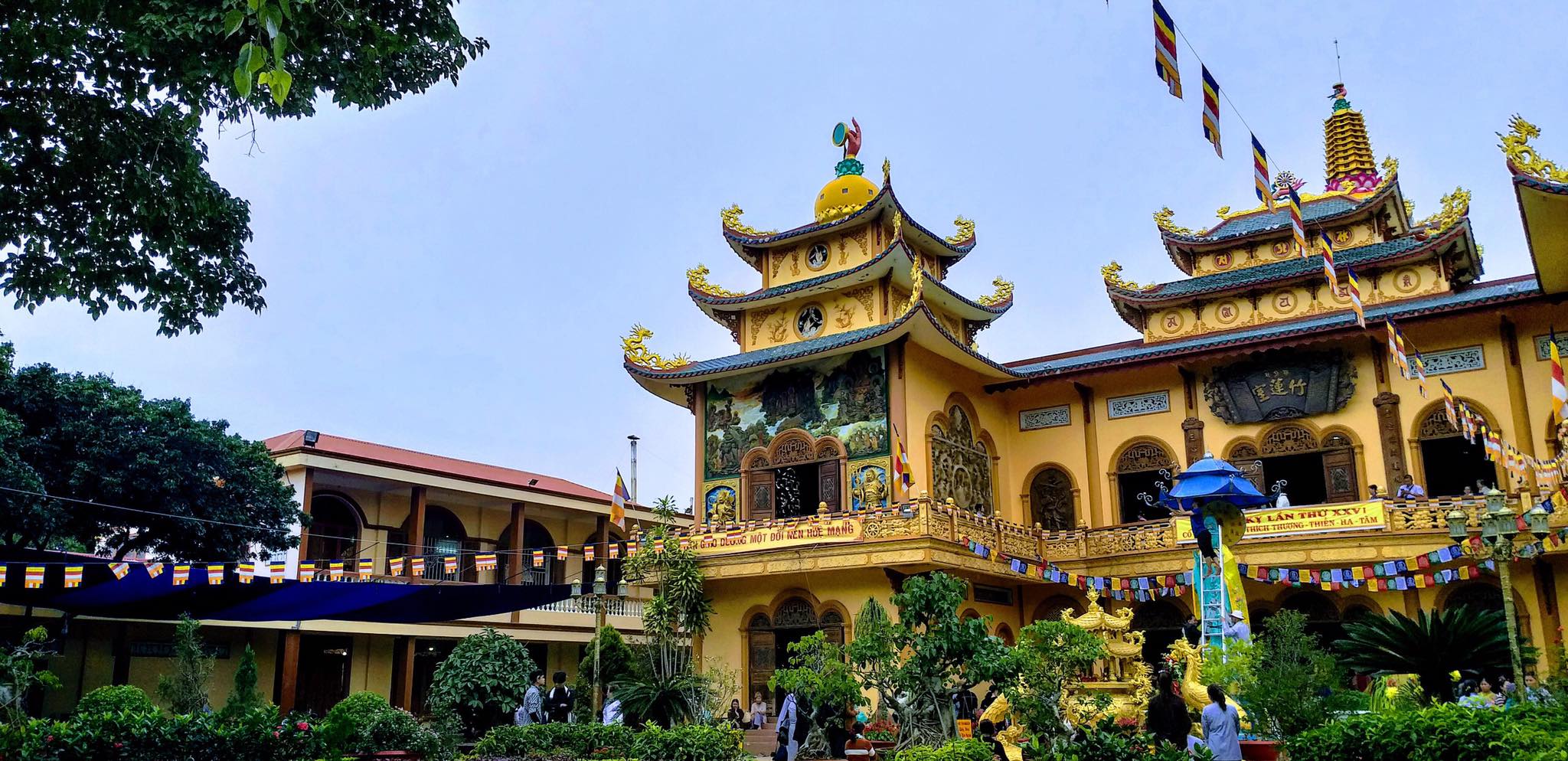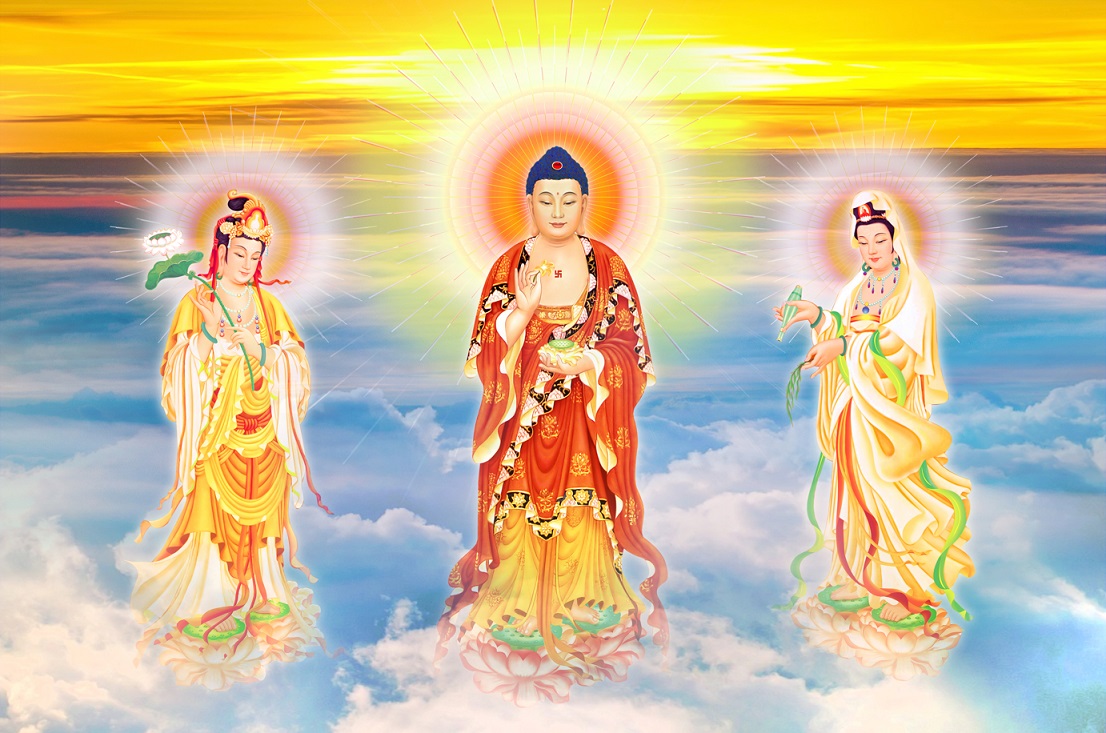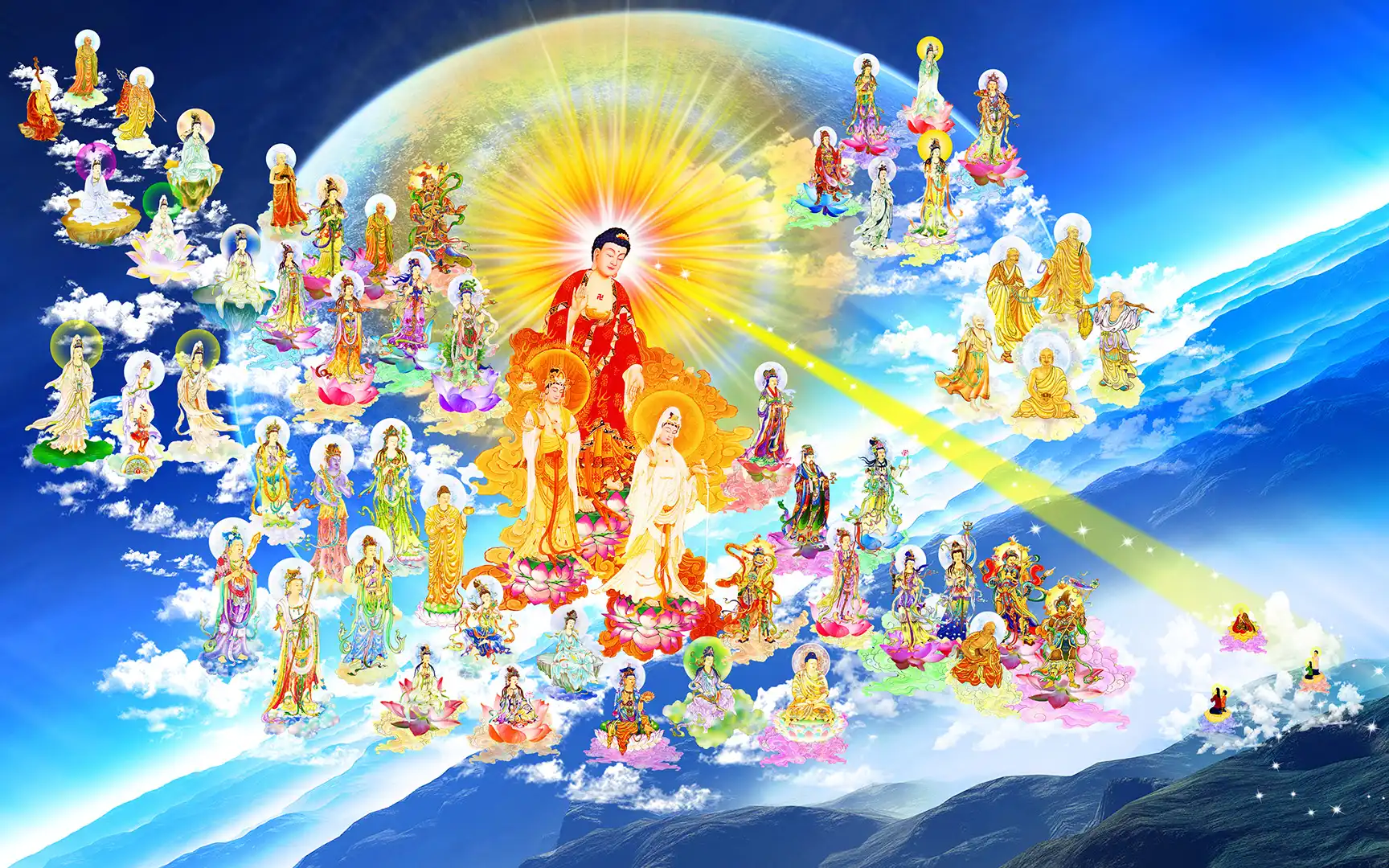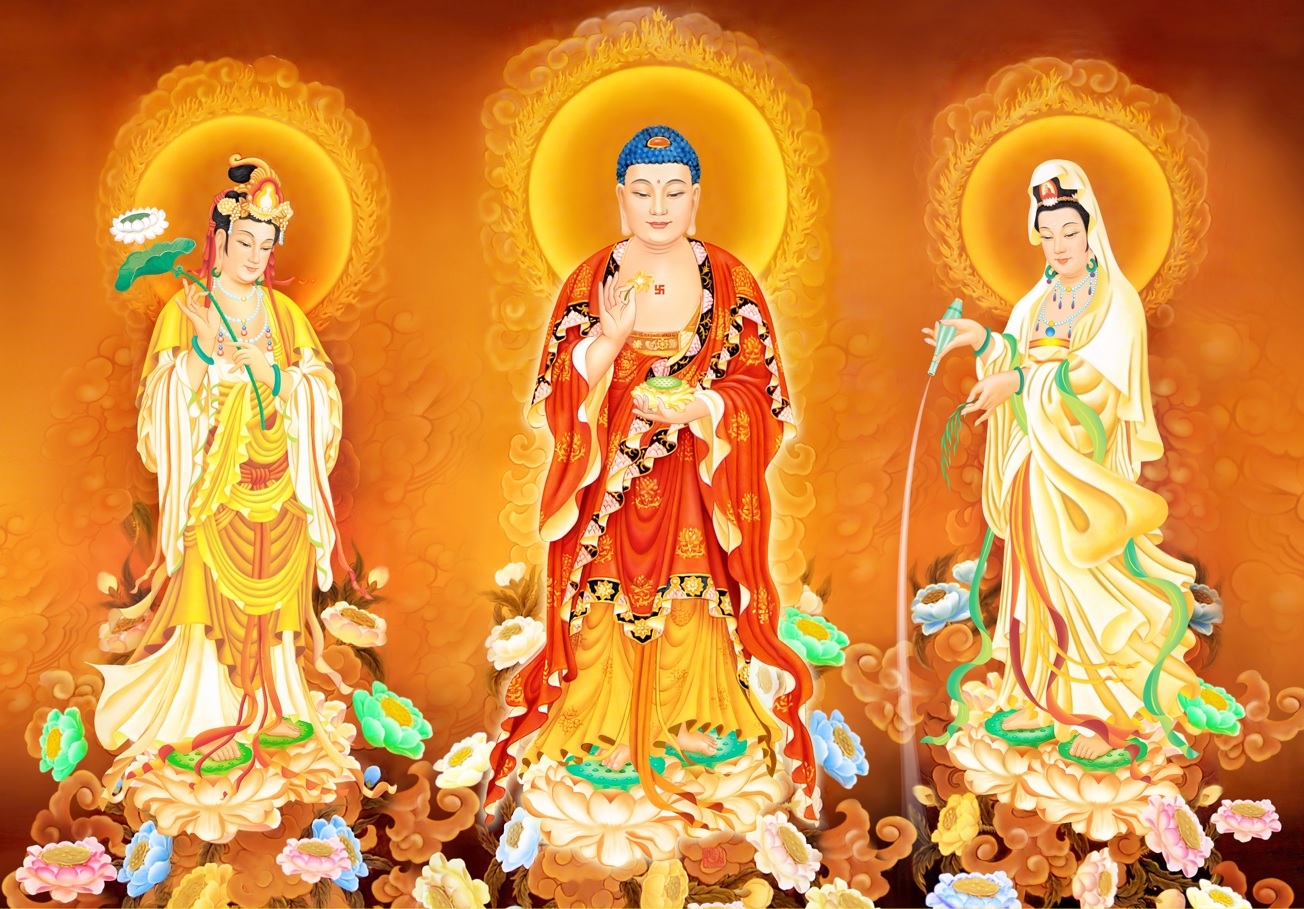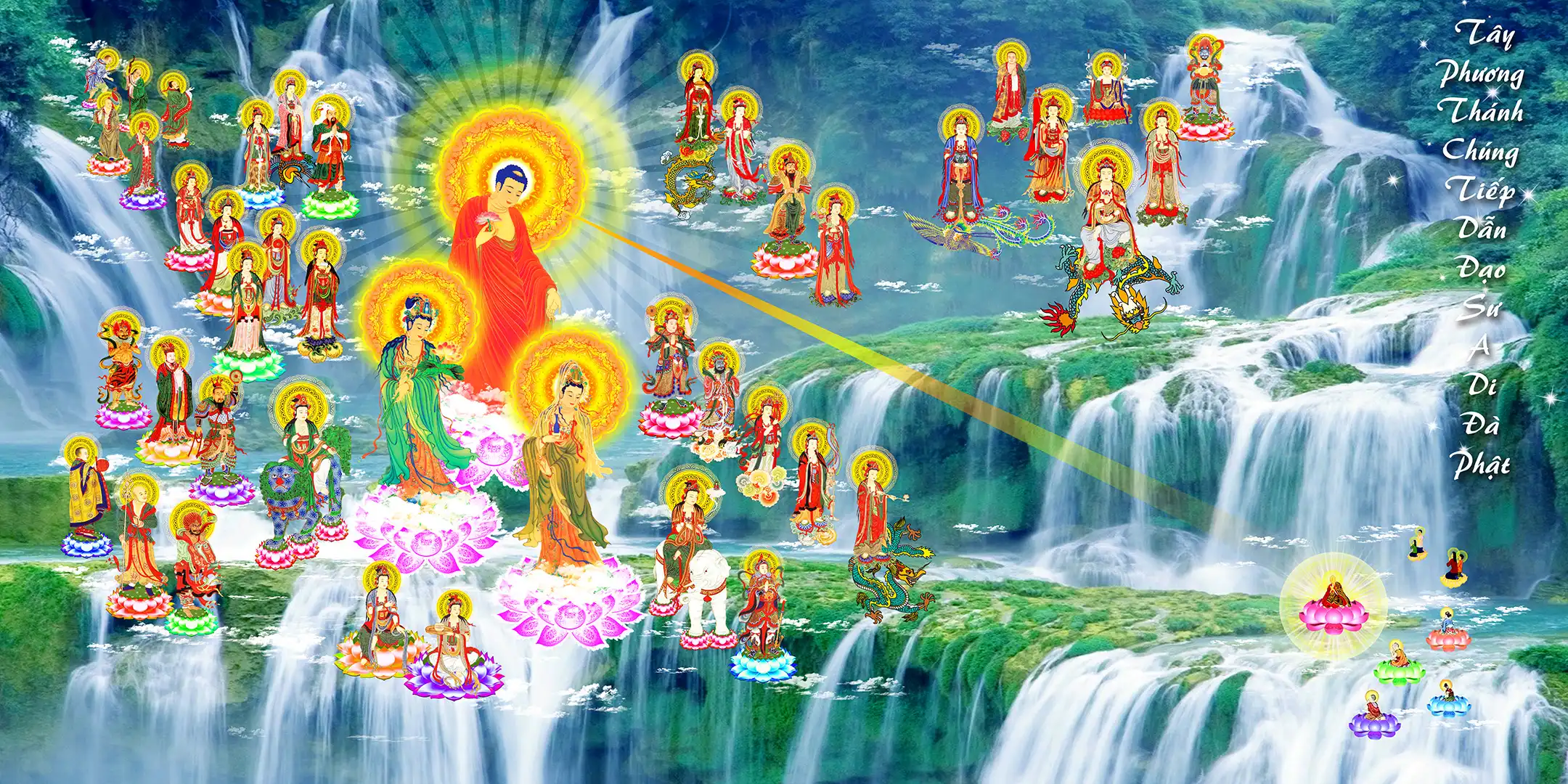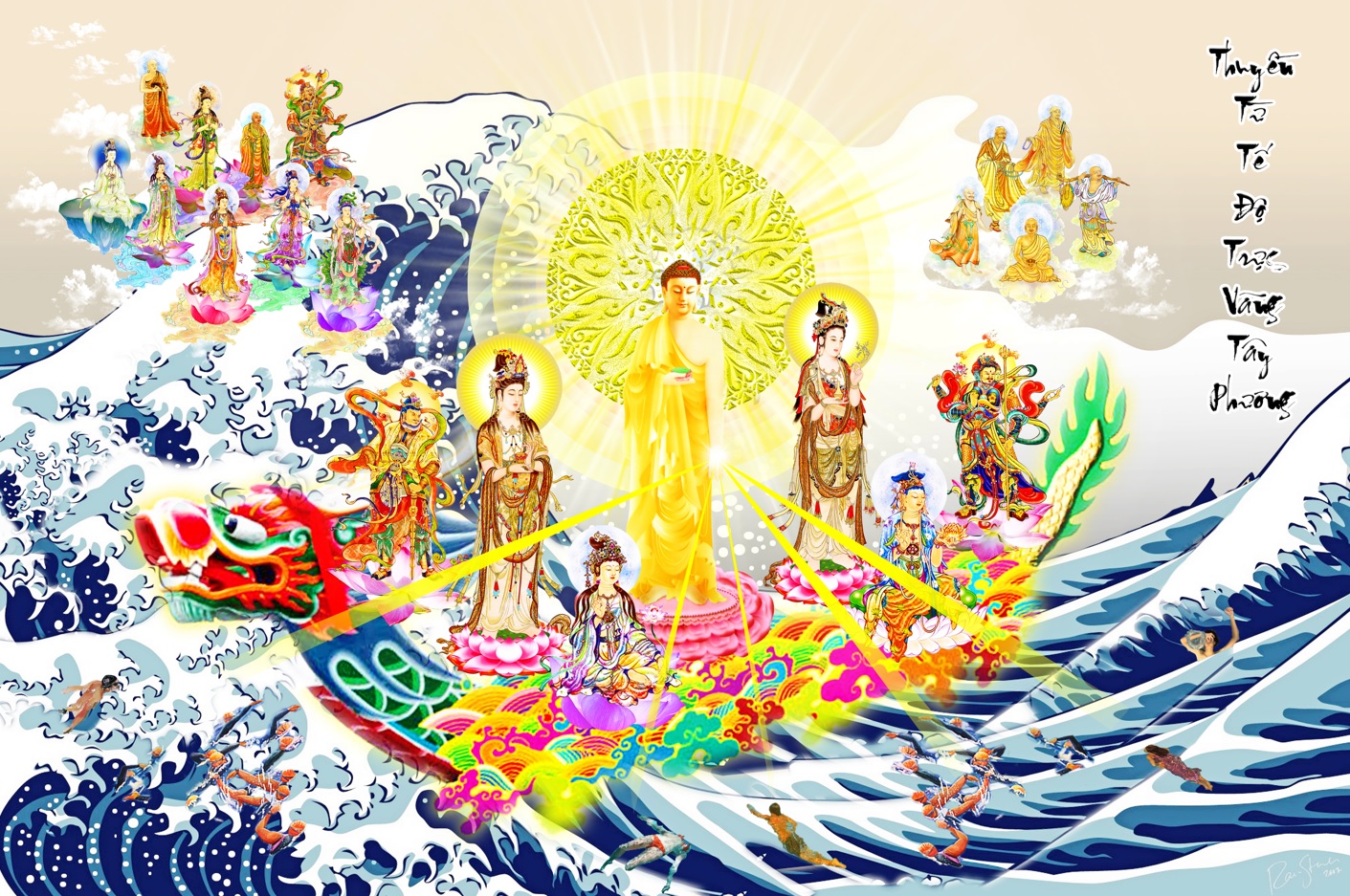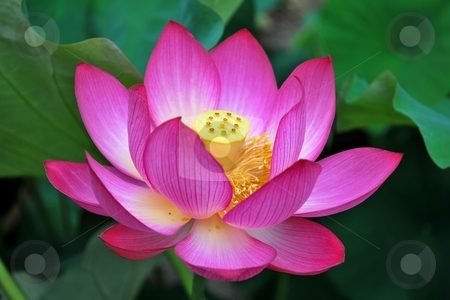THE SIXTH PATRIARCH’S DHARMA JEWEL PLATFORM SUTRA
A Commentary by the Venerable Master Hsuan Hua
Chapter 10
FINAL INSTRUCTIONS
Sutra:
One day the Master summoned his disciples Fa Hai, Chih Ch’eng, Fa Ta, Shen Hui, Chih Ch’ang, Chih T’ung, Chih Ch’e, Chih Tao, Fa Chen and Fa Ju, and said to them, “You are not like other people. After my passage into extinction, you should each be a master in a different direction. I will now teach you how to explain the Dharma without deviating from the tradition of our school.
“First bring up the three classes of Dharma-doors, and then use the thirty-six pairs of opposites, so that, whether coming or going, you remain in the Bodhimandala. While explaining all the dharmas, do not become separated from your self-nature. Should someone suddenly ask you about a dharma, answer him with its opposite. If you always answer with the opposite, both will be eliminated and nothing will be left, since each depends on the other for existence.”
Commentary:
One day the Master called his room-entering disciples together for a talk. They are called room-entering disciples because they had received the transmission of the Master’s Dharma and were therefore permitted to enter his room.
The first of the ten was Fa Hai. You remember him. He edited The Sixth Patriarch Sutra and was a great disciple. He put his name at the head of the list here because, no matter what, he had to be number one.
Chih Ch’eng was the Dharma-thief who later reformed and joined the Master. Fa Ta was the arrogant, Bhikshu who had read The Lotus Sutra over three thousand times but couldn’t bring himself to put his head on the ground before the Master even once. Shen Hui was the thirteen-year-old child who had talked back to the Master. There was also Chih Ch’ang, Chih T’ung, and Chih Ch’e, also known as Flying Cat Chang; Chih Tao, Fa Chen, and Fa Ju. These were the Master’s ten great disciples.
The Master said, “You ten men should each be a master teacher in a certain direction and receive offerings there from humans and gods. I will now teach you how to spread the Dharma without straying from the tradition of our Sudden Enlightenment Dharma Door Teaching.
“In speaking the Dharma,” the Master went on, “the most important thing is to base your speech on the self-nature. How does one do this? Suppose someone asks you a question about the Buddhadharma. Whatever his principle may be, it’s bound to have an opposite. You should answer him with the opposite dharma.
For example, coming and going are relative concepts. Without a coming there is no going; without a going there is no coming. Coming is the prerequisite of going and going can only result from coming. Since opposites depend upon each other for existence, ultimately they both will be cast out, canceling each other out so that nothing is left behind. There will be no coming and no going, for there will be no place left to go.
Sutra:
“The three classes of Dharma doors are the heaps, the realms, and the entrances. The five heaps are: form, feeling, perception, impulses, and consciousness. The twelve entrances are the six sense objects outside: forms, sounds, smells, tastes, tangible objects, and objects of the mind, and the six sense organs within: eye, ear, nose, tongue, body, and mind. The eighteen realms are the six sense objects, the six sense organs and the six consciousnesses.
“The self-nature is able to contain all dharmas; it is the ‘store-enveloping consciousness.’ If one gives rise to a thought, it turns into consciousness, and the six consciousnesses are produced which go out the six organs and perceive the six sense objects.
“Thus the eighteen realms arise as a function of the self-nature. If the self-nature is wrong, it gives rise to eighteen wrongs; if the self-nature is right it gives rise to eighteen rights. Evil functioning is that of a living being, while good functioning is that of a Buddha. What is the functioning based on? It is based on opposing dharmas within the self-nature.”
Commentary:
The self-nature includes all dharma doors, and so it is called the “store-enveloping consciousness.” This is the eighth consciousness, which may be transformed into the wisdom of the great perfect mirror. If you give rise to thinking and considering, the store–enveloping consciousness turns to the seventh consciousness which in turn produces the six consciousnesses which go out the six organs and perceive the six sense objects.
If you use the self-nature correctly, it is the Buddha-use, but if you misuse it you are just a living being. How do the different usages arise? They come from the opposites within the self-nature.
Sutra:
“External insentient things have five pairs of opposites: heaven and earth, sun and moon, light and darkness, yin and yang, and water and fire.
“In speaking of the marks of dharmas one should delineate twelve opposites: speech and dharmas, existence and non-existence, form and formlessness, the marked and the unmarked, the presence of outflows and the lack of outflows, form and emptiness, motion and stillness, clarity and turbidity, the common and the holy, membership in the Sangha and membership in the laity, old age and youth, and largeness and smallness.
“From the self-nature nineteen pairs of opposites arise: length and shortness, deviance and orthodoxy, foolishness and wisdom, stupidity and intelligence, confusion and concentration, kindness and cruelty, morality and immorality, straightness and crookedness, reality and unreality, danger and safety, affliction and Bodhi, permanence and impermanence, compassion and harm, joy and anger, generosity and stinginess, advance and retreat, production and extinction, the Dharma-body and the Form-body, the Transformation-body and the Reward-body.”
The Master said, “If you can understand and use these thirty-six pairs of opposites you can connect yourself with the dharmas of all the Sutras and avoid extremes, whether coming or going. When you act from your self-nature in speaking with others, you are separate from external marks while in the midst of them and separate from inward emptiness while in the midst of emptiness. If you are attached to marks, you will add to your wrong views and if you grasp at emptiness, you will increase your ignorance.”
Commentary:
“Opposite” means mutually dependent and mutually opposed. Nineteen opposites arise as a function of the truesuchness self-nature. For example, if there was no long, there would be no short. Long is the opposite of short and short is the opposite of long. Long and short are relative terms and between them is the Middle Way.
Kindness bestows happiness and is the opposite of cruelty. Morality and immorality are opposites. Morality is the practice of all good actions and the absence of all evil. Compassion pulls living beings out of suffering and is the opposite of harmfulness. Generosity means giving; if you can give, you are not stingy. The Dharma-body pervades all places and is the opposite of the form-body.
Sutra:
“Those who grasp at emptiness slander the Sutras by maintaining that written words have no use. Since they maintain they have no need of written words, they should not speak either, because written words are merely the marks of spoken language. They also maintain that the direct way cannot be established by written words, and yet these two words, ‘not established’ are themselves written.
“When they hear others speaking, they slander them by saying that they are attached to written words. You should know that to be confused as they are may be permissible, but to slander the Buddha’s Sutras is not. Do not slander the Sutras for if you do, your offense will create countless obstacles for you.
“One who attaches himself to external marks and practices dharmas in search of truth, or who builds many Bodhimandalas and speaks of the error and evil of existence and non-existence will not see his nature for many eons.
“Listen to the Dharma and cultivate accordingly. Do not think of the hundred things, for that will obstruct the nature of the Way. Listening without cultivating will cause others to form deviant views. Simply cultivate according to the Dharma, and do not dwell in marks when bestowing it.”
Commentary:
People who are attached to emptiness say that they don’t need anything at all. They say that it isn’t necessary to study the Sutras. They say that they don’t use written words. “Everything’s empty,” they say, don’t use words. Words are nothing but an attachment to marks! If that is so, then nobody should even speak, because written words are simply the visible manifestation of spoken language.
They also say, “The direct mind is the Bodhimandala. Do not set up written words.” But unless you quit speaking altogether, you still have language, and the phrase “do not set up” is itself made up of words.
“Your own confusion is your own business,” the Master adds, “but do not slander the Buddha’s Sutras. You should not refrain from thinking, for if you do, you fall into a useless, dull kind of emptiness. You should cultivate in the way I have instructed you. Do not become attached to appearances.
Sutra:
“If you understand, then speak accordingly, function accordingly, practice accordingly, and act accordingly, and you will not stray from the basis of our school.
“If someone asks you about a meaning, and the question is about existence, answer with non-existence; if you are asked about non-existence, answer with existence; asked about the common life, answer with the holy life; asked about the holy life, answer with the common life. Since in each case the two principles are interdependent, the meaning of the Middle Way will arise between them. If you answer every question with an opposite, you will not stray from the basic principle.
“Suppose someone asks, ‘What is darkness?’ You should answer, ‘Brightness is the cause and darkness the condition. When there is no brightness, there is darkness. Brightness reveals darkness and darkness reveals brightness.’ Since opposites are interdependent, the principle of the Middle Way is established.
“Answer every question that way, and in the future, when you transmit the Dharma, transmit it in the way I am instructing you. Then you will not stray from the tradition of our school.”
Commentary:
If you answer every question with an opposite dharma, you will not deviate from the basic principle of the Sudden Enlightenment doctrine.
Sutra:
In the seventh month of the year Jen Tsu, the first year of the T’ai Chi and Yen Ho reigns (ca 712 A.D.), the Master sent his disciples to Hsin Chou to build a pagoda at Kuo En Temple. He ordered them to hurry the work and it was completed by the end of the summer of the following year.
Commentary:
During the cyclical year Jen Tsu, the reign was renamed twice. In the fifth month it was changed from T’ai Chi to Yen Ho. In the seventh month the emperor abdicated in favor of his son and in the eighth month the reign was renamed Hsien T’ien.
Hsin Chou was the Master’s homeland. His disciples built a pagoda there so that the Master’s body might rest in it after his death.
Sutra:
On the first day of the seventh month he gathered his disciples together and said, “In the eighth month I wish to leave this world. Those of you with doubts should ask about them soon so that I may resolve them for you and put an end to your confusion, because when I am gone there will be no one to teach you.”
Hearing this, Fa Hai and the others wept. Only Shen Hui was unmoved and did not cry. The Master said, “Little Master Shen Hui has attained to the equality of good and evil. He is not moved by blame or praise and does not feel sadness or joy. None of the rest of you have attained that. All these years on the mountain–how have you been cultivating?
“Now you cry. Who are you worrying about? Are you worrying that I don’t know where I’m going? I know where I’m going. If I didn’t know, I wouldn’t have been able to tell you about it in advance. No doubt you are crying because you don’t know where I am going, but if you knew you wouldn’t need to cry. Originally the Dharma nature is not produced or extinguished; it does not come or go.”
Commentary:
The Great Master rang the bell and beat the drum. The sound rang out, summoning all of his disciples to his side. “Pay attention!” he said. “In the eighth month of this year I am going to leave this world.”
Then here he is again! Fa Hai–number one! He didn’t even list the names of the other disciples; he just said, “Fa Hai and the others.”
They all wept. Their eyes ran with tears and their noses ran with snot, just like children who have lost their mother and have no milk to drink. “Waaah! Waaah!” They cried like babies. Some of them cried in secret, some cried openly, and some faked tears, fearing it would be bad manners not to cry along with everyone else. There was both truth and falsehood in the situation; it was exactly like a play.
But the youngest of the babies did not cry. Was it because he was too young to understand or care that he was about to lose his mother, or in this case, his teacher? Was it that?
No. Shen Hui was young in years, but old in wisdom. He understood the principle of not moving in any state. Mencius was forty years old before he reached that level. With an unmoving mind,
They praise: you are not pleased;
They scold: you are not annoyed.
They say you work hard, you are not moved.
They say you are lazy: no matter what
You are not moved.
However, when you are really being lazy and someone scolds you, you can’t say, “I have samadhi. He doesn’t bother me at all.” You must have a true unmoving mind, like that of little Shen Hui.
The Sixth Patriarch called Shen Hui “Little Master.” In the first ten years after taking precepts one is called a “little master,” or “junior-seated.” From ten to twenty years one is “middleseated” and from twenty to thirty years one is “senior seated.”
“Little Master Shen Hui is better than all of you,” the Master said, “because he doesn’t have a discriminating mind. He has truly turned his consciousness into wisdom.”
Shen Hui was not moved by praise or blame. “That Dharma Master does not cultivate! All he does is run after women.” Criticism like that didn’t bother him. “He really works hard. Not only does he not sleep, he doesn’t even lie down. And he only eats once a day. Such austerity!” Praise like that didn’t affect him either.
If you don’t react, then people can slander you but it’s as if nothing happened. “You’re a pig,” they may say. “Fine,” you answer, “I’m a pig. No problem.” If you don’t react, then they can praise you and it doesn’t matter either. “You have both virtue and learning,” they may say, but you pay no attention.
If you are pleased when someone praises your learning, then you really have no learning at all. If you get angry when someone scolds you, you have been influenced by an outside state. To be unmoved by any state is to neither grasp nor reject, neither love nor hate.
You can tell Little Master Shen Hui that he is good, but he will not be happy; you can tell him he is bad, but he will not get angry. He has no thoughts of misery or delight. There truly is complete understanding of the Middle Way. Rare indeed!
“You old ones,” the Master said, “you middle-aged ones, none of you passes. None of you has out-waited the fire.”
When anger sets you ablaze, you should think, “Wait. Wait a minute. Wait a minute and then get angry.” Then you wait, and your anger disappears. That is called “out-waiting the fire.” If you don’t wait, the fire burns, but if you can wait, it will die out.
When steel is red hot, you can shape it into a vessel. But unless you wait for the fire to burn it red hot, you can’t mold the metal; you haven’t out-waited the fire.
“You have been on the mountain for so many years,” said the Master. “What have you been doing all this time? Huh? You hear that I am going to complete the stillness and you cry like babies; you’re all worthless. How have you been cultivating? By eating and sleeping! Are you upset because you think I don’t know where I’m going? I will tell you something! I do know. Of course I know! There is no reason for you to worry about me. I can take care of myself:
No big, no small,
No within or without;
You cultivate, you understand:
You make the arrangements yourself.”
Sutra:
“All of you sit down, and I will recite a verse called ‘The True-False Motion-Stillness Verse.’ If you take it up and recite it, you will be of the same mind as I am. If you rely on it to cultivate, you will not stray from the true principle of our school.”
The assembly bowed and begged the Master to recite the verse.
There is nothing true in anything,
So don’t view anything as true.
If you view anything as true,
Your view will be completely false.
You can know what is true by yourself.
Being apart from the false is the truth of the mind.
When your own mind is not apart from the false
And lacks the truth, then where is the truth?
Commentary:
“Now don’t be nervous,” the Master said. “Sit down and don’t jump around. Don’t cry right in front of me like that. Really, you are undisciplined disciples. Listen to my verse. It discusses the true and the false and the principles of motion and stillness. If you can understand it and bear it in mind, you won’t deviate from the Sudden Teaching.”
“Turn the light around,” said the Master. “Shine it inside at your own self-nature, and you can know the truth. To find your true mind is simply to separate yourself from all the false forms and images of this world. If there is no truth within your own mind, where will you find the truth? The truth is not apart from the self-nature; apart from the self-nature there is no truth.”
Sutra:
Sentient beings understand motion.
Insentient beings do not move.
If you cultivate the work of non-movement,
Like insentient beings, you will not move.
If you seek the true non-movement,
In movement, there is non-movement.
Non-movement is non-movement, but
Things without sentience lack the Buddha-seed.
Fully able to discriminate among marks,
But unmoving in the primary meaning:
The very act of viewing in this way,
Itself is the function of true suchness.
Commentary:
Do not seek non-movement apart from movement, for it is just within movement that stillness can be found. All sentient beings move, but if you can be still while remaining sentient, that is true non-movement. If, as a sentient being, you are able to clearly distinguish the marks of all dharmas, not with your consciousness but with wisdom, you can give proof to the attainment of the substantive principle of your self-nature and achieve the ultimate state. That is true, proper non-movement.
Sutra:
I tell you, students of the Way,
Apply your minds with effort and take care,
At the gate of the Great Vehicle
Do not grasp the wisdom of birth and death.
If there is response at these words,
Then let us discuss the Buddha’s meaning together.
If there is no response,
Join your hands together and make others glad.
The basis of this school is non-contention.
Contention is not the meaning of the Way.
For in grasping at the Dharma doors of
contradiction and contention,
The self-nature enters birth and death.
Commentary:
You are face to face with the Great Vehicle Buddhadharma; do not continue to grasp at your understanding which binds you up in birth and death, at the kind of wisdom that is still attached to marks. If you can’t understand what I am trying to tell you, then put your hands together to please living beings. My school of Sudden Enlightenment is based on the cultivation of the patience of unproduced Dharmas. There should be no debating. When you argue with others you lose the meaning of the Way.
Debating, the thoughts of victory and defeat
Stand in contradiction to the Way.
Giving rise to the four-mark mind,
How can samadhi be obtained?
If you insist on arguing, your self-nature won’t escape the revolving wheel. Giving rise to the marks of a self, others, living beings, and a life, you will certainly continue to undergo birth and death.
Sutra:
When the followers heard this verse, they understood its meaning and bowed down before the Master. They made up their minds to practice in accord with the Dharma and not to argue, knowing that the Great Master would not remain long in the world.
The Senior Seated Fa Hai bowed again and asked, “After the High Master enters extinction, who will inherit the robe and Dharma?”
Commentary:
Fa Hai never forgets himself. No doubt he wanted the robe and bowl for himself.
Sutra:
The Master said, “Since the time I lectured on the Dharma in the Ta Fan Temple, transcriptions of my lectures have been circulated. They are to be called The Dharma Jewel Platform Sutra. Protect and transmit them in order to take humankind across. If you speak according to them, you will be speaking the Orthodox Dharma. I will explain the Dharma to you, but I will not transmit the robe, because your roots of faith are pure and ripe. You certainly have no doubts and are worthy of the great Work. According to the meaning of the transmission verse of the First Patriarch Bodhidharma, the robe should not be transmitted. His verse said,
Originally I came to this land,
Transmitting Dharma, saving living beings.
One flower opens; five petals and
The fruit comes to bear of itself.”
Commentary:
The students didn’t have tape-recorders as we do, so they wrote down their notes with brush and ink and compared them among themselves.
“You should take good care of these lectures,” the Master said. “They are Dharma jewels. Print and distribute them and so take living beings across. I know that you all believe in me, and so I don’t need to transmit the robe. Besides, the Great Master Bodhidharma said that beginning with the Sixth Patriarch the robe should not be transmitted. He said, ‘I originally came to China in order to transmit the right Dharma and take across all these confused living beings. From me, this one flower, in the future five petals will open–the Second, Third, Fourth, Fifth and Sixth Patriarchs. And the fruit will come to bear of itself; that is, there will be no need to transmit the robe. Transmitting the Dharma will suffice.’
This is why the Fifth Patriarch told the Sixth Patriarch, “As the robe is a source of contention, do not transmit it. Should you continue to transmit it, your life will hang by a thread.”
“The fruit comes to bear of itself.” You should know that the fruit which ripens in this line is just all of you who have taken refuge with me. The first character of your Dharma-names is “Kuo” and it means “fruit” or “result.” So don’t forget to ripen.
All of you should ripen right away. Most importantly don’t be lazy! Bodhidharma gave you all predictions long ago. The Sixth Patriarch himself said, “The Bodhi fruit accomplishes itself.” They both knew that, in the future, there would be all of you disciples in America with the first name “Kuo,” fruit. The fruit they spoke of is just all of you. That fruit is you; you are that fruit. The two are one.
Sutra:
The Master added, “All of you Good Knowing Advisors should purify your minds and listen to my explanation of the Dharma. If you wish to realize all knowledge, you must understand the Samadhi of One Mark and the Samadhi of One Conduct.
“If you do not dwell in marks anywhere and do not give rise to hate or love, do not grasp or reject, and do not calculate advantage or disadvantage, production and destruction while in the midst of marks, but instead remain tranquil, calm, and yielding, then you will have achieved the Samadhi of One Mark.
“In all places, whether walking, standing, sitting, or lying down, to maintain a straight and uniform mind, to attain the unmoving Bodhimanda and the true realization of the Pure Land. That is called the Samadhi of One Conduct.”
Commentary:
“Wash your minds clean,” said the Master, “and get rid of greed, hate, and delusion. If you wish to realize all knowledge, you need to understand the Samadhi of One Mark, which consists in not dwelling in marks, and the Samadhi of One Conduct, which consists in not dwelling in conduct.
The Samadhi of One Mark: whether you are in a good place or a bad place, whether moving or still, do not dwell in marks. While in the midst of marks, do not give rise to dislike or to fondness.
Neither love nor hate
Should move the mind;
The mind should not
Grasp or reject.
If you have a thought of love, you will grasp at the object of your desire. The twelve conditioned causes say, “love conditions grasping, grasping conditions existence…”
To reject means to cast away. If you hate something then you reject it. Love and hate cause grasping and rejecting. Do not calculate advantage and disadvantage. If you think, “What’s in it for me?” you are just being greedy, self-seeking, and impure. Do you understand? You should not have such thoughts.
You should remain tranquil, with nothing at all to do, and calm, like water without waves. “No waves” means no afflictions, no love, no hate, no grasping, no rejecting, no advantage, no disadvantage, no success and no failure. You should be yielding, like empty space. Take a look: everything comes from empty space and yet empty space does nothing at all. It does not set itself up as boss and say, “Go be born! Go die!” Everything is born and dies within it, undergoing transformations in a most natural way without the slightest difficulty. Yield and be flexible. If you are flexible then whatever happens just happens. That’s the way it is. There is no greed, hatred, or delusion; there is nothing at all. With few wants, one is content, being without longing or self-seeking.
It is no use to think, “Wait until my book gets published. I will be a famous scholar.”
You may want to do something strange to make the world take notice of you; but you should not have such ideas. You should decrease your desires, no matter what they are, and always be content.
Knowing enough, you’re always happy.
Able to be patient, you’re at peace.
If you can be tranquil, calm, and yielding, and leave marks while in the midst of them, if you can transcend the dust while in the dust, just that is the Samadhi of One Mark.
The Samadhi of One Conduct: no matter where you are, in a good place, a bad place, a wholesome place, an unwholesome place, a right place, a wrong place–walking, standing, sitting or lying down–maintain a direct mind. The direct mind is the Bodhimandala. Students of the Buddhadharma should not be devious.
Be direct in your thoughts, words, and deeds. Speak your mind; don’t think east and speak west. The straight mind is the Bodhimandala. If the cause is not straight, the result will be crooked. Your mind should be uniform and of one purity. You who cultivate the Way: toward others, toward yourself, toward everything, be straightforward. Don’t try to trick people out of their money, no matter how poor you are. If you borrow a little money and return it right away, you have not lost the virtue of a gentleman, but if you borrow and don’t return it, your position is very low.
Be an unmoving Bodhimandala with a straightforward mind, for that is the realization of the Pure Land and is called the Samadhi of One Conduct.
Sutra:
“One who perfects the two samadhis is like earth in which seeds are planted; buried in the ground, they are nourished and grow, ripening and bearing fruit. The One Mark and One Conduct are just like that.
“I now speak the Dharma which is like the falling of the timely rain, moistening the great earth. Your Buddha-nature is like the seeds which, receiving moisture, will sprout and grow. Those who receive my teaching will surely obtain Bodhi and those who practice my conduct will certainly certify to the wonderful fruit. Listen to my verse:
The mind-ground contains every seed;
Under the universal rain they all sprout
Flower and feeling–Sudden Enlightenment:
The Bodhi-fruit accomplishes itself.”
After speaking the verse the Master said, “Dharma is not dual nor is the mind, and the Way is pure and without marks. All of you take care not to contemplate stillness or empty the mind. The mind is basically pure and does not grasp or reject anything. Each of you work hard, and go well, in harmony with circumstances.”
At that time, his followers made obeisance and withdrew.
Commentary:
The timely rain falls just when it is needed. If it falls too soon, it may drown the crops, and if it comes too late, they may wither and die. The Sixth Patriarch’s Dharma is like the timely rain which moistens all of the great earth. Your own inherent Buddha-nature is like seeds which receive the moisture and flourish ripening into Bodhi-fruits. The Bodhi-sprouts become Bodhi-fruits.
The Master went on, “You who understand my doctrine are certain to obtain Bodhi. If you cultivate according to this method, you will surely obtain the wonderful Bodhi-fruit. Now that I have spoken so much Dharma for you, you are probably all flustered, so pay attention while I speak this verse. Purify your minds!
Your self-nature contains every seed;
At the timely rain they all sprout.
When sentient beings suddenly enlighten,
The Flower opens, the fruit is ripened.
And the Bodhi-fruit accomplishes itself.
The wonderful fruit of Bodhi ripens of itself. Bodhidharma said, “The fruit comes to bear of itself,” and the Sixth Patriarch said, “The Bodhi fruit accomplishes itself.” They were speaking of all of you who have the Dharma name “Kuo” (fruit). You should ripen throughout the world. All places should reap this fruit. What fruit? The Bodhi-fruit. The Sixth Patriarch was afraid that you might not have understood and so he spoke it very clearly. “The Bodhi fruit accomplishes itself.” You should all ripen on your own. I cannot help you. If you don’t ripen you are just cheating yourselves. So ripen!
Isn’t this strange? Your Dharma names all begin with the word “fruit,” and our School’s transmission verse says also:
Contemplating, cultivating the
ever blissful fruit;
Personally transmitting the
unconditioned teaching.
In the future all of you will personally transmit the unconditioned teaching.
The Master went on, “My Sudden Enlightenment Dharma door is not two, it is one. What is the one? It is just the Sudden Teaching. The mind is not two either; therefore it should return to the one. The Way we cultivate is pure and without marks.
“Although it is without marks, don’t make the mistake of contemplating stillness because that is just another attachment. Do not loiter in dull emptiness either, because the mind of living beings is naturally and fundamentally pure. The original substance of the mind is pure and immaculate, without grasping or rejecting.
“Work hard, all of you. Go forward and don’t be lazy. Go where circumstances take you and build Bodhimandalas. Be good, cultivate good conduct and work hard.”
Sutra:
On the eighth day of the seventh month, the Master suddenly said to his disciples, “I wish to return to Hsin Chou. Quickly ready a boat and oars.”
The great assembly entreated him earnestly to stay, but the Master said, “All Buddhas appear in the world and then are seen to enter Nirvana. This body of mine must return somewhere.”
The assembly said, “Master, you are leaving, but sooner or later you will return.”
The Master said, “Falling leaves return to the root. There was no day on which I came.”
They further asked, “Who has received the transmission of the Right Dharma-eye Treasury?”
The Master said, “The one who has the Way obtains it; the one without a mind penetrates it.”
Commentary:
“Patriarch,” said the assembly, “you are leaving now, but we can’t believe that you will enter Nirvana. Sooner or later you will come back, won’t you?”
The Master said, “Just as leaves fall and return to the root of the trees, I must go. Besides, there was no day on which I came.”
The Chinese text reads, “When I came I had no mouth,” but this is a misprint for the word “day.” However, you can also explain it as, “When I came I had no mouth.” On the day when the Patriarch came into this world, he had no mouth; that is, he had no words. He did not speak Dharma when he came and he did not speak Dharma when he left; coming and going he did not speak Dharma. The Dharma does not increase or decrease and although he spoke Dharma for so many years, he never spoke Dharma at all.
There are no fixed Dharmas. You can explain it any way you wish, as long as you are in accord with principle. But if you don’t explain it correctly, you can explain your listeners right into the hells, and that is taking the unfixed Dharma too far.
The Patriarch’s disciples, unable to bear the thought of their Master’s imminent departure, tried to delay him with questions until the Master, in exasperation, probably decided that they were just too much trouble. “I’m getting out of here,” he probably thought.
The “Right Dharma-eye Treasury” refers to the robe and bowl. So many disciples, and yet not one of them knew who had received the Dharma transmission. If they hadn’t been greedy for it themselves, they wouldn’t have asked this question. Why else would they be “standing by the river and gazing out into the sea?” If you weren’t longing for the sea, why would you be standing there? Everyone thought the robe and bowl was extremely important, but the Sixth Patriarch was not a business man. If he had been, at $65.00 a transmission, he could have made a lot of money.
“Who got the transmission? The one who has the Way obtains it; the one without a mind penetrates it. Whoever has no self-seeking mind understands my Dharma, because he has obtained the Samadhis of the One Mark and the One Conduct.”
The Sixth Patriarch’s Dharma is to be found in these verses and these principles, and if you cultivate according to them you will obtain his Dharma.
Sutra:
They further asked, “In the future, there won’t be any difficulties, will there?
The Master said, “Five or six years after my extinction, a man will come to take my head. Listen to my verse:
Offerings to the parents with bowed head.
There must be food in the mouth.
When the difficulty of ‘Man’ is met,
The officials will be Yang and Liu.
Commentary:
Remembering the demonic difficulties which had beset the Master during his lifetime–assassination attempts, arson, thievery, and spying–the Master’s disciples wondered what would happen when he was gone.
I know that the Sutra does not record all of the hardships the Master underwent. There were at least six attempts made to steal the robe and bowl and the thieves were armed and prepared to kill the Master, if necessary. So his disciples asked hopefully, “There won’t be any difficulties like that in the future, will there? No one will want to kill us, will they? Will they try to kill us instead of you?”
While he was alive, they tried to take his life. After his death, they tried to steal his head. In those days it wasn’t easy to be Patriarch. It’s not so difficult today, however, so don’t retreat.
The Sixth Patriarch’s verse was a prophecy. No one understood it at the time, but later it came true. Five or six years after the Master’s death, a Korean monk named Chin Ta Pei hired Chan Ching Man of Hung Chou to steal the Patriarch’s head and bring it back to Korea so that he could make offerings to it.
Chan Ching Man was poor and hungry and so he took the money because “there must be food in the mouth.” The Korean monk was no doubt very rich.
At the time of the “difficulty” of Chan Chin “Man,” the Magistrate was named Liu T’ien and the Governor was named Yang K’an.
The flesh-body of the Patriarch was housed in the pagoda. Having heard the Master’s prediction, his disciples had bound his neck with sheets of iron for protection. Chan Ching Man chopped at it with his knife, but he wasn’t able to remove the Master’s head. He made a lot of noise, and when the Bhikshus came running to catch him they saw a man wearing white mourning clothes run from the pagoda. The Bhikshus reported the incident to the police and within five days the thief was arrested and brought to Nan Hua Temple to be tried.
“Why did you try to steal the Sixth Patriarch’s head?” they asked.
“A Korean monk paid me to do it,” he said, “and I was hungry, so I took his money.”
The Magistrate turned to the Master’s disciple Ling T’ao and said, “What do we do now?”
Ling T’ao said, “According to the law, he deserves to die, but in the Buddha’s teaching there are no friends or enemies. Besides, the Master predicted this would happen. Let him go.”
“The Buddha’s gate is indeed wide,” said the Magistrate, and he set the criminal free.
Sutra:
The Master also said, “Seventy years after my departure, two Bodhisattvas, one who has left home and one who is a layman will simultaneously come from the east to propagate and transform. They will establish my School, build and restore monasteries, and glorify the Dharma for its heirs.”
Commentary:
The Bodhisattva who had left home was Patriarch Ma Tsu Tao I. He built many monasteries in China. It is said, “Ma Tsu built the temples and Pai Chang wrote the rules.” Pai Chang was Ma Tsu’s Dharma successor.
The Bodhisattva who had not left home was P’ang Yün, the enlightened layman. His entire family was enlightened, wife, daughter, and son, and they all went to Nirvana. Layman P’ang had been incredibly wealthy, but he built a big boat one day, put all of his money in it, sailed out to sea, and dumped it overboard.
Some say that the two Bodhisattvas are Dhyana Master Huang Po and layman P’ei Hsiu. You may explain it any way you like, as long as you pick two people: a monk and a layman.
Layman P’ang gave all his money as a gift to use for remodeling the Dragon Palace at the bottom of the sea. He returned to his home and took up a lowly occupation, and in the midst of their bitter poverty, the P’ang family cultivated the Way.
One day, Mr. P’ang sighed,
It’s hard, it’s hard
It’s really just as hard as putting seeds
On all the leaves
Of trees in the yard.
“What do you know, old man?” said Mrs. P’ang. “It’s not hard at all. In fact,
It’s easy, it’s easy
It’s easy, because I find
On the tip of every blade of grass
The Patriarch’s mind.”
She thought it was easy and he thought it was hard. Then their little daughter came and disagreed with both of them:
It’s not easy,
It’s not hard;
I eat when I’m hungry and
I sleep when I’m tired!
“There’s nothing to it!” she said.
Although Mr. P’ang was married, he and his wife were like good friends and did not carry on like ordinary men and women. As a consequence, they became enlightened. Lay people should all imitate their inconceivable purity.
Sutra:
The assembly made obeisance again and asked, “Will you please let us know for how many generations the teaching has been transmitted since the first Buddhas and Patriarchs appeared in the world?”
The Master said, “The Buddhas of antiquity who have responded to appear in the world are numberless and uncountable.”
Commentary:
“Their number is incalculable,” said the Master. “Besides, I never learned to read or write and I’m not very good at arithmetic. So let’s not count them.”
Sutra:
“But now I will begin with the last seven Buddhas. In the Past ‘Adorned Eon’ there were Vipashyin Buddha, Shikhin Buddha, and Vishvabhu Buddha. In the present ‘Worthy Eon’ there have been Krakucchanda Buddha, Kanakamuni Buddha, Kashyapa Buddha, and Shakyamuni Buddha.”
Commentary:
In the Adorned Eon (Alamkarakalpa) a thousand Buddhas appeared in the world. The 998th Buddha of that kalpa was Vipashyin Buddha. His name means “Victorious Contemplation,” “Every Kind of Contemplation,” “Victorious View,” or “Every Kind of View.” If you just remember “Vipashyin Buddha” that will do for general purposes.
“Shikhin Buddha.” Shikhin is translated as “fire.” “Vishvabhu Buddha” was the last Buddha of the Adorned Eon.
We are now living in the Worthy Eon (Bhadrakalpa), socalled because many worthy sages will appear during it.
Of the thousand Buddhas of this eon, Krakucchanda Buddha was the first. His name means “Worthy of Offerings,” because he should receive the offerings of humans and gods. His name also means “Adornment.”
The second Buddha was Kanakamuni, the third, Kashyapa, and the fourth, Shakyamuni. These are the most recent Buddhas.
Sutra:
“From Shakyamuni Buddha, the transmission went to Arya Mahakashyapa, Arya Ananda, Arya Sanakavasa, Arya Upagupta, Arya Dhrtaka, Arya Miccaka, Arya Vasumitra, Arya Buddhanandi, Arya Buddhamitra, Arya Parshva…”
Commentary:
Shakyamuni Buddha, in the midst of the millions of humans and gods who were circumambulating him, picked up a flower and Mahakashyapa, the First Patriarch, had to smile. No one knew what was happening when Shakyamuni Buddha said, “I have the Right Dharma-eye Treasury, the wonderful mind of Nirvana, the real mark, which is unmarked. This is the mind-tomind transmission, transmitted outside the teaching. I have already given it to Mahakashyapa in mind-to-mind transmission.”
The Third Patriarch, the Venerable Sanakavasa, was born wearing clothes, and as he grew, his clothes grew along with him. After he left home under Arya Ananda, his clothes changed into a great Samghati robe. Just before he died, he said, “This robe will not decay until Shakyamuni Buddha’s Dharma is completely extinguished.”
The Tenth Patriarch, Arya Parshva, lived in his mother’s womb for more than sixty years. He was born with white hair and a white beard, just like Lao Tzu in China.
Lao Tzu lived in his mother’s womb for eighty-one years and was born with white hair and a long white beard. They named him “Lao Tzu” which means “Old Child,” but he was actually a reincarnation of Mahakashyapa. He was reborn in China because Shakyamuni Buddha had noticed that the Chinese had good karmic roots. Most of them did not believe in the Buddha, however, so Mahakashyapa was sent to China to found the religion of Taoism, which is the same as the Brahman religion of India and which cultivates purity of conduct.
Arya Parshva, the Tenth Patriarch, was born with a liking for cultivation. When he met the Ninth Patriarch, Buddhamitra, he left home and the Dharma door of the Buddha’s mind-seal was transmitted to him.
Sutra:
“…Arya Punyayashas, Mahasattva Ashvaghosha, Arya Kapimala, Mahasattva Nagarjuna, Arya Kanadeva, Arya Rahulata, Arya Sanghanandi, Arya Gayashata…”
Commentary:
When the Eleventh Patriarch, Punyayashas, met Parshva he asked him, “How can I realize Buddhahood?”
Parshva said, “You wish to realize Buddhahood? It is just your present non-realization.”
Punyayashas said, “You say that my present non-realization is the Buddha, but how can I know that?”
Parshva replied, “How can you know that your present nonrealization is not the Buddha?”
With that question and that answer, Punyayashas became enlightened and received the Dharma transmission. Later on, he met the Great Master Ashvaghosha, the Eleventh Patriarch. Mahasattva Ashvaghosha was extremely intelligent. Punyayashas knew that Ashvaghosha’s conditions were ripe–he was ready to become the twelfth Patriarch. When Punyayashas went to teach him, Ashvaghosha asked, “How can I know the Buddha?’”
Punyayashas said, “You wish to know the Buddha? He is just your not knowing.”
Ashvaghosha said, “Not knowing the Buddha, how can I know that my not knowing is the Buddha?”
Punyayashas said, “If you do not know the Buddha, how can you know that your not knowing is not the Buddha?”
Ashvaghosha said, “Ah! So this is the meaning of sawing! You say this and I say that, and we hack at the principle like sawing through a piece of wood.”
Punyayashas replied, “Ah! So that is the meaning of wood! But what is the meaning of sawing?”
Ashvaghosha said, “It’s just what you are! And what is the meaning of wood?”
Punyayashas said, “You have just been sawed open by me; you have just been liberated by me.”
Ashvaghosha was instantaneously enlightened. He left home, received the transmission, and became the Twelfth Patriarch. He was called Ashvaghosha, “horse cry,” because when he spoke the Dharma all the horses cried out. He was a Mahasattva, that is, a “great being,” a great Bodhisattva.
Nagarjuna Bodhisattva, the Fourteenth Patriarch, is the one who went to the Dragon Palace and brought back the Avatamsaka Sutra. He was very, very wise.
Sanghanandi, the Seventeenth Patriarch, asked Gayashata, the Eighteenth Patriarch, “How old are you?”
The child replied, “I’m one hundred years old.”
“But you’re so young,” said the Patriarch, “how can you be a hundred years old?”
“If I were a hundred years old and did not understand the Buddhadharma, I would not be as good as a one-day-old baby who did.”
Hearing such an intelligent answer, the Seventeenth Patriarch let the child leave the home life under him and later transmitted the Dharma to him.
Sutra:
“…Arya Kumarata, Arya Jayata, Arya Vasubandhu, Arya Manorhita, Arya Haklena, Arya Aryasimha, Arya Basiasita, Arya Punyamitra, Arya Prajnatara, Arya Bodhidharma, Great Master Hui K’o, Great Master Seng Ts’an, Great Master Tao Hsin, Great Master Hung Jen, and I, Hui Neng, am the Thirty-Third Patriarch. Thus the transmission has been handed down from patriarch to patriarch. In the future transmit it accordingly from generation to generation. Do not allow it to become extinct.”
The assembly heard and faithfully accepted what the Master had said, bowed, and withdrew.
Commentary:
Aryasimha, the Twenty-Fourth Patriarch, was a native of Central India. In his practice of the Buddhadharma, he traveled to Kashmir. The King of Kashmir did not believe in the Buddha, but instead followed two non-Buddhist leaders who were intent on destroying Buddhism. As Bhikshus were not allowed within the country, the King demanded of Aryasimha, “Have you ended birth and death?”
Aryasimha wanted to convert the King. “I have ended it,” he answered.
“The Buddha’s teaching says that practicing the Bodhisattva way, you must give up your head, your eyes, your brains, and your blood. You must give up whatever someone happens to need. Now, I need your head. Give it to me! Since you have ended birth and death, you must give me your head. Can you do it?”
“I don’t even have birth or death,” said Aryasimha. “What does it matter if I lose my head? It’s yours. Take it.”
The King sliced off Aryasimha’s head but instead of blood, a milky white fluid ran out of his neck. The King’s arm fell to the ground. No one cut it off; it fell off by itself because he had murdered an Arhat. The King then put the two leaders of the non-Buddhist religion to death, but there was nothing special about their executions. They bled just like everyone else. The King prohibited their non-Buddhist religion and spread the Buddhadharma widely.
Sutra:
On the third day of the eighth month of the year Kuei Ch’ou, the second year of the Hsien T’ien reign (A.A. 713), after a meal in Kuo En Temple, the Master said, “Each of you take your seat, for I am going to say goodbye.”
Fa Hai said, “What teaching dharma will the High Master leave behind so that confused people can be led to see the Buddha-nature?”
The Master said, “All of you please listen carefully. If those of future generations recognize living beings, they will have perceived the Buddha-nature. If they do not recognize living beings, they may seek the Buddha throughout many eons, but he will be difficult to meet.
“I will now teach you how to recognize the living beings within your mind and how to see the Buddha-nature there. If you wish to see the Buddha, simply recognize living beings, for it is living beings who are confused about the Buddha and not the Buddha who is confused about living beings.
“When enlightened to the self-nature, the living being is a Buddha. If confused about the self-nature, the Buddha is a living being. When the self-nature is impartial, the living being is the Buddha. When the selfnature is biased, the Buddha is a living being.
“If your thoughts are devious and malicious, the Buddha dwells within the living being, but by means of one impartial thought, the living being becomes a Buddha. Our minds have their own Buddha and that Buddha is the true Buddha. If the mind does not have its own Buddha, where can the true Buddha be sought? Your own minds are the Buddha; have no further doubts. Nothing can be established outside the mind, for the original mind produces the ten thousand dharmas. Therefore the Sutras say, ‘The mind produced, all dharmas are produced; the mind extinguished, all dharmas are extinguished.’”
Commentary:
The Great Master instructed his disciples to take their seats. In Buddhism, everything has a fixed order. Those who take precepts first stand or sit in front of those who take them later. If you have held precepts for even one day longer, you sit in front.
Once again Fa Hai, number one, heard that the Sixth Patriarch was going, and so he acted as spokesman. He was the oldest, so naturally he was higher than everyone else. “What Dharma will you leave with us, High Master, so that we can teach the deluded ones of future generations to understand the mind and see the nature?”
The Master said, “If you want to find the Buddha, you must look among living beings. If you recognize living beings, you recognize the Buddha-nature.” Why does Never-Slighting Bodhisattva bow before everyone he meets? Because he knows that everyone is a Buddha, he will accomplish Buddhahood himself. If he saw everyone as a demon, he would become a demon.
See the Buddha within your own mind; don’t seek him outside. If you wish to see the Buddha you must first respect living beings and recognize them all as the Buddha; then you’ve understood the mind and seen your nature. Confused living beings do not recognize the Buddha, but the Buddha recognizes living beings.
If you are biased and continually pick at other people’s faults, even if you are a Buddha, you turn into a living being. Living beings and the Buddha are a thought apart.
Buddha is mind; mind is Buddha. Right thoughts are the Buddha; deviant thoughts are the demon. Pure thoughts are the Buddha; defiled thoughts are the demon. Take a look at your thoughts. If you can keep your mind clean, that is the real Buddha. Without a clear, pure, genuine Buddha-mind, where can you go to find the Buddha? You’ll never find him. The Buddha is made in your mind; do not seek him outside.
Nothing is separate from the self-nature. Nothing is separate from your own mind. The ten thousand dharmas are all produced from your mind, not from outside.
The Buddha spoke all dharmas
For the minds of living beings.
If there were no minds,
What use would dharmas be?
Sutra:
“Now, to say goodbye, I will leave you a verse called the ‘Self-Nature’s True Buddha Verse.’ People of the future who understand its meaning will see their original mind and realize the Buddha Way. The verse runs:
The true-suchness self-nature
is the true Buddha.
Deviant views, the three poisons,
are the demon king.
Commentary:
The most important part of the Platform Sutra is this last verse. It explains everything extremely well. The Sixth Patriarch left it not just for the people of his day, but for us, now, to cultivate according to its principles. He saw that you and I would be here listening. We all have a share, and we should cultivate according to this verse because we are all people of future generations, not animals. The animals of future generations will have to be reborn as people before they can have a share. The Sixth Patriarch spoke this verse for people, not animals. Animals who wish to become Buddhas must first be reborn as human beings.
We should not lose this opportunity.
“The true-suchness self-nature is the true Buddha.” The selfnature is your mind. Your true-suchness self-nature is also called the real mark, the Tathagata Store, the Buddha-nature, and your own nature. True suchness is just your own nature which is the true Buddha.
“Deviant views, the three poisons, are the demon king.” If you know the true Buddha, you should also know the demon king. The demon king is just your deviant views: greed, hate, and delusion, the three poisons. Greed for riches, greed for sex, greed for anything at all is nothing but poison.
If, after you leave home, you are still greedy and self-seeking, that too is poison. If you scheme to get more disciples, that is poison.
So, you see, we have been here for a long time and not many have taken refuge and become disciples. Those who take refuge must do it on their own. No one advises them. If I told you to take refuge with me, you might wonder if I had the right to be your teacher and Good Knowing Advisor. I don’t know myself whether I am a Good Knowing Advisor, and so I do not go about it in this way.
Sutra:
At times of deviant confusion the demon king is in the house;
But when you have proper views the Buddha is in the hall.
Deviant views, the three poisons produced within the nature,
Are just the demon king come to dwell in the house.
Proper views casting out three poisons of the mind
Transform the demon into Buddha–-true, not false.
Commentary:
“Deviant confusion” is ignorance. Ignorance creates love and desire, and that is the demon king dwelling in your house.
If you have proper views and not the wrong ones of greed, hate, and delusion, then your mind is pure and the Buddha is in the hall.
The Buddha and the demon are both manifested from your own nature. When you hold deviant views, the three poisons arise, and the demon comes to dwell in your house. What is your house? Your body.
Proper views spontaneously expel the three poisons, and the demon immediately changes into Buddha. This principle is absolutely true; it cannot possibly be false. You need only hold proper views, and that is the Buddha. Improper views are the demon.
Sutra:
Dharma-body, Reward-body, and Transformation-body:
Fundamentally the three bodies are one body.
Seeing that for yourself within your own nature
Is the Bodhi-cause for realizing Buddhahood.
The pure nature is originally produced from the Transformation-body.
The pure nature is ever-present within the Transformation-body,
One’s nature leads the Transformation-body down the right road.
And in the future the full perfection is truly without end.
Commentary:
Although spoken of as three, the clear, pure Dharma-body, the perfect, full Reward-body, and the hundred thousand myriads of Transformation bodies are fundamentally one. The three bodies are simply transformations of your one body. This is called “Three in one, one in three.”
Your seeing for yourself the true Buddha within your selfnature is a cause for your future realization of Buddhahood. It is a seed of Buddhahood. Having planted the Bodhi-seed, you will certainly reap the Bodhi-fruit and become a Buddha.
The clear, pure self-nature originally arises from the Transformation-body. Your pure self-nature, your pure Dharmabody, is within your Transformation body.
In the future, your Bodhi self-nature will be perfected, and the perfect, full Reward-body will be truly inexhaustible.
Sutra:
The root cause of purity
is the lust nature,
For once rid of lust,
the substance of the nature is pure.
Each of you, within your natures;
abandon the five desires.
In an instant, see your nature–it is true.
Commentary:
Everyone has sexual desire, but you do not need to be afraid of it. In The Shurangama Sutra we read about Ucchusma, the “Fire-Head Vajra” whose sexual desire was unbearably intense when he first began to cultivate. But he was able to discipline and temper the fire of lust, transforming it into the fire of wisdom and transforming himself into the “Fire-Head Vajra.”
“The root cause of purity is the lust nature.” Proper thoughts are the cause of purity in the nature, and deviant thoughts the cause of impurity. Therefore cut off the nature of sexual desire, which means transform it. This certainly is not telling you to castrate yourself. That’s not the answer. Just change your thoughts and make them pure in nature. You don’t have to cut off sexual desire. Don’t cut it off, transform it instead. Transform lust into purity, which is simply proper knowledge and proper views. The lust within the nature is simply deviant knowledge and deviant views.
“Once rid of lust, the substance of the nature is pure.” To get rid of lust means to transform it. You don’t have to throw it away, all you have to do is transform it. You don’t have to throw it away, all you have to do is change your thoughts and direct them to the pure nature. That is the clear, pure, substance of the self-nature, the Dharma-body.
The five desires are for wealth, sex, fame, food, and sleep. They may also be explained as forms, sounds, smells, tastes, tangible objects, and objects of the mind. In general, stay far away from them; do not have deviant thoughts within your selfnature. Cultivate proper knowledge and proper views, and abandon the five desires. Once you leave the five desires, you can see the nature in an instant and obtain your own truesuchness wonderful nature.
Sutra:
If in this life you encounter the door of the Sudden Teaching
You will be suddenly enlightened to your selfnature, and see the Honored of the World.
If you wish to cultivate and aspire to Buddhahood,
You won’t know where the truth is to be sought
Unless you can see the truth within your own mind,
This truth which is the cause of realizing Buddhahood.
Not to see your self-nature but to seek the Buddha outside:
If you think that way, you are deluded indeed.
I now leave behind the Dharma-door of the Sudden Teaching
To liberate worldly people who must cultivate themselves.
I announce to you and to future students of the Way:
If you do not hold these views you will only waste your time.
Commentary:
Having encountered the Sudden Teaching of the Dhyana School, you may become instantly enlightened and understand your original mind and see your original nature. At that moment you will personally meet the World Honored Ones, the Buddhas of the ten directions; you can see them all.
Unless you apply effort in the self-nature instead of looking outside, you will never find the genuine Buddha. Understand your mind and see your nature: that is the way to realize Buddhahood.
If you do not turn the light around and seek within yourself, but run outside instead to look for the Buddha, you are being stupid, stupid, extremely stupid.
You must cultivate the Dharma of Sudden Enlightenment on your own. Do not fail to cultivate. If you do not hold the notions expressed in this verse, you are wasting your time. You’ll never obtain the smallest advantage.
Sutra:
Having spoken the verse the Master continued, “All of you should take care. After my extinction, do not act with worldly emotion. If you weep in sorrow, receive condolences, or wear mourning clothes, you are not my disciples, for that is contrary to the proper Dharma. Simply recognize your own original mind and see your own original nature which is neither moving nor still, neither produced nor extinguished, neither coming nor going, neither right nor wrong, neither dwelling nor departing.”
Commentary:
The Master said, “Unlike common, vulgar, worldly folk, do not make an emotional display of your feelings. Don’t behave like that. Don’t weep tears like rain to irrigate the fields. My disciples have to obey me! If you do such things, not only are you not my disciples, but you are also contradicting the Buddhadharma.
“Do not strike up false thinking. Don’t fail to put it down. Don’t fail to break through it. You must see through it, smash it, and put it all down. Then you can be free.”
“If we are not supposed to mourn, then what should we do?” the disciples wondered.
“Recognize your original mind. What is it like? It doesn’t move and it isn’t still. It doesn’t come or go. It’s not right or wrong, good or bad, black or white, long or short. It doesn’t stay and it doesn’t leave. It’s neither here nor there. Work to see the self-nature; understand your mind. Then you will not have wasted your time.”
Sutra:
“Because I am afraid that your confused minds will misunderstand my intention, I will instruct you again so that you may see your nature. After my extinction, continue to cultivate accordingly, as if I were still present. Should you disregard my teaching, then even if I were to remain in the world, you would obtain no benefit.”
He further spoke this verse:
Firm, firm: Do not cultivate the good.
High, high: Do not do evil.
Still, still: Cut off sight and sound.
Vast, vast: The mind unattached.
Commentary:
“Firm, firm” means not moving: “thus, thus unmoving,” clear, clear, and constantly bright. “Do not cultivate the good,” does not mean that you should not cultivate good. It just means that you should not be attached when you cultivate the good. Don’t be like that greedy-minded ghost Emperor Wu of Liang who thought, “Look at all my merit!”
“High, high,” means happy and cheerful, independent and content from morning to night. Do not do evil does not mean that you can think, “I am not attached to doing evil, so it’s no problem.” Attached or not attached, you should not do evil. What is evil? Killing, stealing, and sexual misconduct.
Of the ten-thousand evils
Licentiousness is the worst.
Do not walk down
This road of death.
Do not walk this road. Do not do evil.
“Still, still: Cut off sight and sound.” This state is peaceful, comfortable, and happy. Still, still, quiet, quiet, you cut off sight and sound by not producing deviant thoughts at the gates of the six sense organs. It is all right to have proper thoughts, but cut off the deviant ones. Cut off deviant sights and sounds. For example, if people are speaking improperly, don’t listen.
“Vast, vast: The mind unattached.” This mind’s capacity extends throughout the universe and fills up heaven and earth. It is high, great, broad, vast, limitless, and unbounded, and it is not attached anywhere.
Sutra:
After speaking this verse, the Master sat upright until the third watch, when suddenly he said to his disciples, “I am going!” In an instant he changed, and a rare fragrance filled the room. A white rainbow linked with the earth, and the trees in the wood turned white. The birds and the beasts cried out in sorrow.
Commentary:
The Master sat meditating with his disciples until the middle of the night, at twelve o’clock, when he said, “The time has come to go. See you all again!” His energy was cut off and he no longer moved. He had entered Nirvana. “He changed” means that he moved to a new house. Who moved? The flesh-body Bodhisattva!
The forest turned white because the white rainbow light shone on it. You could also say that the trees knew the Master was dead and so they expressed their grief by wearing the white clothes of mourning.
All the animals on the mountain cried uncontrollably. Grass and trees seem to be without feelings, but they put on mourning clothes; birds and beasts ordinarily don’t understand very much, but they showed forth a spiritual nature and wept.
Sutra:
In the eleventh month, a dispute arose among the officials, disciples, Sangha, and laity of the three countries of Kuang Chou, Shao Chou, and Hsin Chou as to who should receive the true body.
As they could not agree, they lit incense and prayed saying, “The Master will be returned to the place indicated by the incense smoke.”
The smoke went directly to Ts’ao Hsi and so, on the thirteenth day of the eleventh month, the reliquary and the transmitted robe and bowl were returned there. In the following year, on the twenty-fifth day of the seventh month, the body was removed from the reliquary and Disciple Fang Pien anointed it with incense paste.
Remembering the prophecy that his head would be taken, the disciples wrapped sheets of iron and lacquered cloth around his neck for protection and then placed his body in the pagoda. Just then a white light appeared within the pagoda, shot up into the sky, and did not fade for three days. The Magistrate of Shao Chou reported this to the Emperor and received an imperial order to erect a stone tablet commemorating the Master’s conduct in the Way.
The Master’s springs and autumns were seventy-six. The robe was transmitted to him when he was twenty-four and when he was thirty-nine his hair was cut. For thirty-seven years he spoke Dharma to benefit living beings. Forty-three men inherited his Dharma, and an uncountable number awoke to the Way and overstepped the common lot.
The robe of belief transmitted from Bodhidharma, the Mo Na robe and precious bowl conferred by Emperor Chung Tsung, as well as the lifelike image sculpted by Fang Pien and other articles of the Way, were entrusted to the attendant in charge of the stupa and were permanently retained at the Pao Lin Bodhimandala for the Bodhimanda’s protection.
The Platfom Sutra has been transmitted to set forth the principles of our school, to glorify the Triple Jewel, and to benefit all living beings.
Commentary:
Those from Kuang Chou wanted to take the body to Fa Hsing Temple. “The Sixth Patriarch had his head shaved here. He should return here now to receive offerings.”
The Hsin Chou people all said, “The Great Master is a native of Hsin Chou. He should return there!” and those of Shao Chou insisted that since the Patriarch had expounded his teaching there he should not be returned to that place.
While the Patriarch was alive, they had never quarreled over him, for he had been most independent. But now the Master had completed the stillness and everyone felt as if they personally had the right to remove his body and make offerings to it.
“Wasn’t the Sixth Patriarch originally from Hsin Chou? And didn’t the Master himself say, ‘Falling leaves return to the root?’”
“But the Sixth Patriarch himself built Nan Hua Temple,” said those of Shao Chou. “He really should return there.”
“The Patriarch left home in Kuang Chou. He let his hair fall there and his Dharma should all fall back to us!”
The text says that “they could not agree,” and that indicates that the situation was extremely grave; it was a crisis. Everyone was trying to take the body away by force. They argued and argued until one intelligent person said, “Stop! While he was alive, we obeyed the Master’s instructions. Now that he has died, we should still listen to him. Let’s ask the Master to decide!”
“But he’s already dead,” they said. “How can he tell us where he wants to go?”
“The Master has great spiritual powers,” he said, “And he knows all of our thoughts. It must displease him to see us here fighting over the right to make offerings to his body. Let’s light some incense, and in whatever direction the smoke drifts, that is where the Master wants to go. Then no one can argue about it.”
The smoke went straight to Nan Hua Temple and there was nothing that the people from Kuang Chou and Hsin Chou could say.
The lectures are now complete and the Sutra has been explained. You have undergone much suffering, but I don’t know whether you realized it was suffering or not. If you felt it was suffering, you are just a common person, but if you did not feel that it was suffering, then you are just a rock or a piece of wood. Well, was it suffering?
As to my explanation, I don’t know whether I explained well or badly, and I also don’t know if you listened well or badly. Good and bad–get rid of them both! Explaining is just explaining and listening is just listening.
We have met because of a karmic affinity. We have heard the story of the Sixth Patriarch’s life and of his cultivation of the Way. You should not look for good or bad points, but look instead to see whether you believe. Advance down the right road and retreat from the wrong.
You should cultivate according to the Dharma. Memorize the last verse of this Sutra and recite it often, for if you reflect on its meaning you will certainly realize Buddhahood. And don’t discriminate as to whether I explained the Sutra well or not. Just look to see whether or not you cultivate. If you cultivate, what is bad is good, but if you do not cultivate, what is good is bad.
Now I am going to ask you a question. The Sixth Patriarch was an illiterate, and illiterates cannot have much knowledge. How could someone who couldn’t even read speak a Sutra? What does this mean?
[Student: “I think the Sutra shows that you don’t need a lot of scholarly learning in order to become enlightened. The Sudden Teaching is just the mind, realizing the mind, and we should do it.]
Who else has a view? This is a democracy. Speak up!
[Student: “In the Sixth Patriarch’s Dharma explanation, where could a word arise?”]
[Student: “The principles contained in the Sutra are so clear and out in front, that, every time I try to say something about them, I get tied up in dualism and feel hopelessly overwhelmed.”]
Does anyone else have an opinion?
[Student: “Master, when the Sixth Patriarch was about to enter Nirvana, he said, ‘See you later.’ Where is he now?”]
He comes right from where you are speaking!
Now, why was it that the Master never learned to read? During the time of the Sixth Patriarch, schools were not available to all, and to attend, you had to have money. The Sixth Patriarch’s family was extremely poor, because his father was an honest official who never took bribes. As a boy, even getting food to eat was a problem for the Master, so of course he couldn’t go to school. It was a question of environment, then. He never learned to read because his family was poor and because schools were not available.
But there is yet another reason. Why did the Sixth Patriarch choose to appear in a poor family? He did it to show us that even illiterates can realize Buddhahood and become Patriarchs. Thus he raised the hopes of those who could not read.
Seeing the Sixth Patriarch, everyone thought, “He never went to school but he cultivated and obtained the fruit of the Way. We can do it too!” It is not the case that if you can’t read, you can’t cultivate. If you think, “Only educated people can cultivate,” you are holding a prejudice. The Sixth Patriarch appeared to cause us all to lay down such prejudices. As I see it, these are three reasons why the Sixth Patriarch never learned to read.
There’s one more thing you should recognize clearly about the Sixth Patriarch. He was not lazy. He always practiced the Buddhadharma. He became enlightened and after his enlightenment he spoke the Platform Sutra. Being able to read is just worldly knowledge. The Sixth Patriarch understood his mind, saw his nature, and opened up to his inherent wisdom. Because this Sutra was spoken from the bright light of this wisdom, its value is incomparable. It is the same as Sutras spoken by the Buddha, so do not take him lightly just because he couldn’t read.
The Sutra is now complete, and, after teaching it, I make that statement to all of you.

